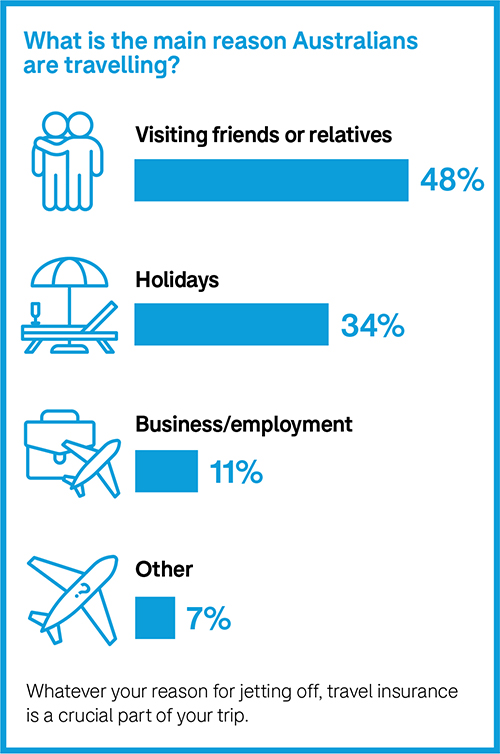
- Contact Apia
- CTP & MAI Insurance
- Home & Property Insurance
- Car & Vehicle Insurance
- Health Insurance
- Funeral & Personal Injury Insurance
Apia no longer offers new travel insurance policies.
Apia has permanently ceased selling travel insurance policies. The Insurance Council of Australia offers a free service called Find An Insurer that may assist you in finding alternative insurance.

Travel Insurance Policy Documents
For full details of what is and isn't covered please refer to the relevant Product Disclosure Statement (PDS)
Customers in need of extra help and support
We understand that sometimes our customers need extra care and support at different points in their lives.
We also know that everyone’s situation and needs will be different. We are commited to looking after your needs with sensitivity, dignity, respect and compassion.
Find out more
TTY / National relay service
If you have a hearing or speech impairment you can call us through the National Relay Service. TTY/Voice
Type and Read, Type and Listen or Speak and Read 13 36 77
Speak and Listen(or speech to relay) 1300 555 727
Internet relay calls
Connect to the NRS (see www.relayservice.com.au )

Translating and interpreting service available.
Insurance Fraud Hotline
1300 881 725 [email protected]
Fraud Intelligence Locked Bag 32524 Brisbane QLD 4001
Insurance Council Australia
Find out more about the General Insurance Code of Practice

Financial Services Council
Find out more about the Life Insurance Code of Practice

- Motor Insurance
- Home Insurance
Funeral Insurance
- Code of Practice
- News & Media
- Cookie & Data Policy
- Online Terms & Conditions
- Get a quote
- Retrieve a quote
- Make a payment
- Make a claim
- Track a claim
- Find my policy
- Policy documents
- Ways to save
- Apia Good Life
- Severe Weather
- Identify scams
- Customer care
- Customer Relations & Complaints

Website Feedback
Cookie and Data Policy We use cookies and other related technologies to improve and tailor your website experience. See our Cookie and Data Policy . This policy provides information about how Apia collects and uses data related to your online activity, and how you can choose to remain anonymous.
AAI Limited Australian Pensioners Insurance Agency Pty Ltd (Apia) ABN 14 099 650 996 AR 239591 is an authorised representative of AAI Limited ABN 48 005 297 807 AFSL 230859 (AAI), the issuer of Home, Landlord, Car, Motorcycle, Caravan, Motorhome, Boat, Travel, Compulsory Third Party Personal Injury (CTP) Insurance and Motor Accident Injuries Insurance (MAI Insurance). Registered Office: Level 23, 80 Ann Street, Brisbane QLD 4000.
Any advice provided is general advice only and has been prepared without taking into account any person's particular objectives, financial situation or needs, consider whether it is appropriate for you before acting on it. Read the Product Disclosure Statement (and any related documents) before making a decision about general insurance. The Target Market Determination is also available
Health Insurance Apia Health Insurance is issued by nib health funds limited ABN 83 000 124 381 (nib), a registered private health insurer, and is marketed by Platform CoVentures Pty Ltd ABN 82 626 829 623 (PC), a Suncorp Group company. PC is an authorised agent of nib and receives commission from nib.
Life Products Any advice on this page in connection with the Life products is general in nature and is provided by Platform Ventures Pty Ltd ABN 35 626 745 177 AFS Representative Number 001266101 (PV). PV is part of the Suncorp Group and an authorised representative of TAL Direct Pty Limited ABN 39 084 666 017, AFSL 243260 (TAL Direct).
Apia Funeral Insurance is issued by TAL Life Limited ABN 70 050 109 450 AFSL 237848 (TAL Life) which is part of the TAL Dai-ichi Life Australia Pty Limited ABN 97 150 070 483 group of companies (TAL). TAL is not part of the Suncorp Group. TAL Life uses the Apia brand under licence from the Suncorp Group. The different entities of TAL and the Suncorp Group of companies are not responsible for, or liable in respect of, products and services provided by the other.
Any advice on this page in connection with the Life products is general in nature and is provided by Platform Ventures Pty Ltd ABN 35 626 745 177 AFS Representative Number 001266101 (PV). PV is part of the Suncorp Group and an authorised representative of TAL Direct Pty Limited ABN 39 084 666 017 AFSL 243260 (TAL Direct). General advice does not take into account your individual needs, objectives or financial situation. Before you decide to buy or to continue to hold a Life Product you must read the relevant Product Disclosure Statement . The Target Market Determination (TMD) for the product is also available.
TAL Life is proud to have adopted the Life Insurance Code of Practice (Code) . The Code has been developed voluntarily by the Life Insurance industry to promote high standards of service to consumers, provide a benchmark of consistency within the industry, and establish a framework for professional behaviour and responsibilities.
This content is current for Home and Contents, Home and Contents Extra, Village Style Residence, Apartment Style Residence, Assisted Living Residence, Landlord, Car Advantage, Motorcycle, Caravan, Motorhome and Boat Insurance policies commenced or renewed on or after 23 March 2021.
U.S. News takes an unbiased approach to our recommendations. When you use our links to buy products, we may earn a commission but that in no way affects our editorial independence.
The 5 Best COVID-19 Travel Insurance Options

Travelex Insurance Services »

Allianz Travel Insurance »

World Nomads Travel Insurance »

Generali Global Assistance »

IMG Travel Insurance »
Why Trust Us
U.S. News evaluates ratings, data and scores of more than 50 travel insurance companies from comparison websites like TravelInsurance.com, Squaremouth and InsureMyTrip, plus renowned credit rating agency AM Best, in addition to reviews and recommendations from top travel industry sources and consumers to determine the Best COVID Travel Insurance Options.
Table of Contents
- Rating Details
- Travelex Insurance Services
- Allianz Travel Insurance
Even though COVID-19 is no longer considered a global emergency, concerns around illness-related costs remain for many travelers. If you're looking for travel insurance that covers COVID – as well as other potential disruptions like flight delays and lost luggage – these are your best options.
- Travelex Insurance Services: Best Optional Coverage Add-ons
- Allianz Travel Insurance: Best for Multitrip and Annual Plans
- World Nomads Travel Insurance: Best for Active Travelers
- Generali Global Assistance: Best for Comprehensive Travel Insurance
- IMG Travel Insurance: Best for Travel Medical Insurance
Best COVID Travel Insurance Options in Detail
Plans include coverage for COVID-19
Optional CFAR coverage is available with Travel Select plan
Some coverages require an upgrade, including rental car collision, accidental death and dismemberment, and more
Not all add-ons are available with every plan
Allianz offers some travel insurance plans that come with an epidemic coverage endorsement
Single-trip, multitrip and annual plans available
COVID-19 benefits don't apply to every plan
Low coverage limits with some plans (e.g., only $10,000 in emergency medical coverage with OneTrip Basic plan)
24-hour travel assistance services included
More than 200 sports and activities covered in every plan
Low trip cancellation benefits ($2,500 maximum) with Standard plan
No CFAR option is offered
Free 10-day trial period
Some coverage limits may be insufficient
Rental car damage coverage only included in top-tier Premium plan
Offers travel medical insurance, international travel health insurance and general travel insurance plans
Some plans include robust coverage for testing and quarantine due to COVID-19
Not all plans from IMG offer coverage for COVID-19
Cancel for any reason coverage not available with every plan
Frequently Asked Questions
When comparing COVID-19 travel insurance options, you'll want to make sure you fully understand the coverages included in each plan. For example, you should know the policy inclusions and limits for COVID-related claims, including coverage for testing, treatments, trip cancellation or COVID-related interruptions that can occur. Meanwhile, you should understand how your coverage will work if you contract some other illness while away from home.
Also ensure your travel insurance coverage will kick in for other mishaps that occur, and that limits are sufficient for your needs. If you're planning a trip to a remote area in a country like Costa Rica or Peru , you'll want to have emergency evacuation and transportation coverage with generous limits that can pay for emergency transportation to a hospital if you need treatment.
You can also invest in a travel insurance policy that offers cancel for any reason coverage. This type of travel insurance plan lets you cancel and get a percentage of your prepaid travel expenses back for any reason, even if you just decide you're better off staying home.
It depends on your private health insurance provider and/or travel insurance policy. As of May 11, 2023, private health insurers are no longer required to cover the cost of COVID-19 testing. Out-of-pocket costs for COVID-19 test kits at local drugstores and on Amazon are relatively affordable, however.
As you search for plans that will provide sufficient coverage for your next trip, you'll find travel insurance that covers COVID-19 quarantine both inside and outside the United States. However, you'll typically need to have your condition certified by a physician in order for this coverage to apply. Also make sure your travel insurance plan includes coverage for travel claims related to COVID-19 in the first place.
Many travel insurance plans do cover trip cancellation as a result of COVID-19, although the terms vary widely. You typically need to be certified by a physician in order to prove your condition. Disinclination to travel because of COVID-19 – such as fear of exposure to illness – will generally not be covered. This means you will actually have to test positive for coronavirus for benefits to apply; simply not wanting to travel is not a sufficient reason to make a claim.
If you want more flexibility in your COVID-19 travel insurance, ensuring you have a cancel for any reason policy may be your best bet, but be sure to check with your chosen travel insurance provider to assess your options.
Why Trust U.S. News Travel
Holly Johnson is an award-winning writer who has been covering travel insurance and travel for more than a decade. She has researched the best travel insurance options for her own trips to more than 50 countries around the world and has experience navigating the claims and reimbursement process. Over the years, Johnson has successfully filed several travel insurance claims for trip delays and trip cancellations. Johnson also works alongside her travel agent partner, Greg, who has been licensed to sell travel insurance in 50 states.
You might also be interested in:

5 Best Travel Insurance Plans for Seniors (Medical & More)
Holly Johnson
Discover coverage options for peace of mind while traveling.

Does My Health Insurance Cover International Travel?
Private health insurance typically doesn't cover international travel expenses.

8 Cheapest Travel Insurance Companies Worth the Cost
U.S. News rates the cheapest travel insurance options, considering pricing data, expert recommendations and consumer reviews.

Is Travel Insurance Worth It? Yes, in These 3 Scenarios
These are the scenarios when travel insurance makes most sense.
- Credit Cards
- All Credit Cards
- Find the Credit Card for You
- Best Credit Cards
- Best Rewards Credit Cards
- Best Travel Credit Cards
- Best 0% APR Credit Cards
- Best Balance Transfer Credit Cards
- Best Cash Back Credit Cards
- Best Credit Card Sign-Up Bonuses
- Best Credit Cards to Build Credit
- Best Credit Cards for Online Shopping
- Find the Best Personal Loan for You
- Best Personal Loans
- Best Debt Consolidation Loans
- Best Loans to Refinance Credit Card Debt
- Best Loans with Fast Funding
- Best Small Personal Loans
- Best Large Personal Loans
- Best Personal Loans to Apply Online
- Best Student Loan Refinance
- Best Car Loans
- All Banking
- Find the Savings Account for You
- Best High Yield Savings Accounts
- Best Big Bank Savings Accounts
- Best Big Bank Checking Accounts
- Best No Fee Checking Accounts
- No Overdraft Fee Checking Accounts
- Best Checking Account Bonuses
- Best Money Market Accounts
- Best Credit Unions
- All Mortgages
- Best Mortgages
- Best Mortgages for Small Down Payment
- Best Mortgages for No Down Payment
- Best Mortgages for Average Credit Score
- Best Mortgages No Origination Fee
- Adjustable Rate Mortgages
- Affording a Mortgage
- All Insurance
- Best Life Insurance
- Best Life Insurance for Seniors
- Best Homeowners Insurance
- Best Renters Insurance
- Best Car Insurance
- Best Pet Insurance
- Best Boat Insurance
- Best Motorcycle Insurance
- Travel Insurance
- Event Ticket Insurance
- Small Business
- All Small Business
- Best Small Business Savings Accounts
- Best Small Business Checking Accounts
- Best Credit Cards for Small Business
- Best Small Business Loans
- Best Tax Software for Small Business
- Personal Finance
- All Personal Finance
- Best Budgeting Apps
- Best Expense Tracker Apps
- Best Money Transfer Apps
- Best Resale Apps and Sites
- Buy Now Pay Later (BNPL) Apps
- Best Debt Relief
- Credit Monitoring
- All Credit Monitoring
- Best Credit Monitoring Services
- Best Identity Theft Protection
- How to Boost Your Credit Score
- Best Credit Repair Companies
- Filing For Free
- Best Tax Software
- Best Tax Software for Small Businesses
- Tax Refunds
- Tax Brackets
- Taxes By State
- Tax Payment Plans
- Help for Low Credit Scores
- All Help for Low Credit Scores
- Best Credit Cards for Bad Credit
- Best Personal Loans for Bad Credit
- Best Debt Consolidation Loans for Bad Credit
- Personal Loans if You Don't Have Credit
- Best Credit Cards for Building Credit
- Personal Loans for 580 Credit Score Lower
- Personal Loans for 670 Credit Score or Lower
- Best Mortgages for Bad Credit
- Best Hardship Loans
- All Investing
- Best IRA Accounts
- Best Roth IRA Accounts
- Best Investing Apps
- Best Free Stock Trading Platforms
- Best Robo-Advisors
- Index Funds
- Mutual Funds
- Home & Kitchen
- Gift Guides
- Deals & Sales
- Best of Wellness Awards 2024
- Sign up for the CNBC Select Newsletter
- Subscribe to CNBC PRO
- Privacy Policy
- Your Privacy Choices
- Terms Of Service
- CNBC Sitemap
Follow Select
Our top picks of timely offers from our partners

The best Covid-19 travel insurance companies to protect yourself against the uptick in cases
Travel insurance can help if you have to cancel or cut a trip short due to covid..

Though the height of the pandemic may have passed, Covid-19 continues to be a consideration in everyday life. And that's especially true for those who are traveling or booking a trip.
Getting sick on the road or having to cancel your vacation because of illness is a common concern. However, travel insurance can help you ensure you're covered. Many travel insurance policies consider Covid like they would any other illness, but not all. So, you'll still want to carefully read any travel insurance policy you're considering to make sure Covid isn't excluded. For the most comprehensive coverage, you'll want to opt for a plan with cancel for any reason (CFAR) coverage.
To find the travel insurance policies best suited to handle Covid-related issues, CNBC Select looked at Covid coverage and limits for medical coverage and evacuation, among other factors. We found four standouts for the best Covid travel insurance policies. (See our methodology to learn more about how we created this list.)
Best Covid-19 travel insurance
- Best overall : AXA Travel Insurance
- Runner up : Nationwide Travel Insurance
- Best for luxury travel : Berkshire Hathaway Travel Protection
- Best for cancel for any reason coverage : Allianz Travel Insurance
Best overall
Axa assistance usa travel insurance.
The best way to estimate your costs is to request a quote
Policy highlights
AXA Assistance USA offers several travel insurance policies that include travel interruption, trip cancellation, and the option of cancel for any reason (CFAR) coverage.
24/7 assistance available
- Three tiers of plans available
- Highly rated for financial strength
- Cancel for any reason only available on highest-tier coverage
Who's this for? AXA Travel Insurance is ideal for those seeking high coverage limits for emergency accident and sickness medical expenses, as well as emergency evacuations.
Standout benefits: AXA's silver plan offers up to $25,000 of medical emergency accident and illness coverage and $100,000 of emergency evacuation coverage, higher than many of the base travel plans we compared. The company's gold and platinum plans offer higher limits, up to $250,000 of medical emergency coverage and $1 million of evacuation coverage. When comparing AXA policies, make sure you have the "Epidemic Coverage Endorsement" included.
[ Jump to more details ]
Runner up
Nationwide travel insurance.
Nationwide's wide coverage for travel insurance allows many different types of travelers to find coverage that fits their needs. Three levels of cruise insurance coverage gives extra options to cruise passengers.
- 10-day review period on cruise insurance policies to make sure the plan meets your needs (not available in NY or WA)
- Most basic cruise plan doesn't offer CFAR coverage
Who's this for? Nationwide's travel insurance offers higher limits than many other base plans we reviewed, with limits of $75,000 for medical coverage and $250,000 of emergency evacuation coverage in its essential plan.
Standout benefits: Nationwide offers several plans tailored to different needs, including a cruise-specific travel insurance plan and an annual plan for frequent travelers.
Best for luxury travel
Berkshire hathaway travel protection.
Berkshire Hathaway Travel Protection has multiple plans to cover vacations from luxury travel to adventure travel. The brand's LuxuryCare offers the highest limits of travel insurance coverage offered by the company. Quotes and policies are available online.
- Wide variety of policies available
- Strong financial strength rating by AM Best
- Cancel for any reason only provides reimbursement for up to 50% of non-refundable trip payments
Who's this for? Those considering expensive travel can find sufficient coverage with Berkshire Hathaway Travel Protection that meets a variety of needs, including coverage for Covid if needed.
Standout benefits: Berkshire Hathaway's top-tier LuxuryCare Travel Insurance includes coverage for up to 150% of the trip cost for trip interruption coverage and $100,000 of medical expense coverage.
Best for cancel for any reason coverage
Allianz travel insurance.
10 travel insurance plans make it possible to customize your coverage. For families, Allianz's OneTrip Prime package covers children age 17 and younger when traveling with a parent or grandparent.
- Trip cancellation benefits can reimburse your prepaid, nonrefundable trip payments if you have to cancel your trip for one of the covered reasons stated in your plan documents.
- Limited coverage for risky sports
Who's this for? For those wanting the option to cancel for any reason (CFAR), Allianz Travel Insurance plans offer lots of different options, including CFAR add-ons.
Standout benefits: Allianz's Cancel Anytime upgrade can reimburse up to 80% of non-refundable trip costs for almost any unforeseeable reason not already covered by the policy. That's higher than most other CFAR coverage, which generally covers 70% to 75% of non-refundable trip costs. It's only available on the brand's OneTrip Prime and OneTrip Premier policies.
More on our top Covid travel insurance companies
Axa travel insurance .
AXA offers three travel insurance plans starting at $16. Its silver plan, the lowest tier of coverage, offers high limits for emergency medical expenses at $25,000 and up to 100% of trip costs for trip interruption coverage. Many policies now include epidemic-related covered reasons.
CFAR coverage available?
Yes, up to 75% of prepaid, nonrefundable trip costs
24/7 assistance?
[ Return to summary ]
Nationwide Travel Insurance
Nationwide offers travel insurance plans for single trips, multi-trips and cruise-specific plans. The company has an A+ rating for financial strength from rating agency AM Best, and its most basic single trip and cruise plans offer a high limit of $75,000 of medical coverage.
Berkshire Hathaway Travel Protection
Berkshire Hathaway's travel coverage can be tailored towards the specific needs of cruise and luxury travelers, with options for higher coverage limits for medical coverage and trip interruption benefits.
Yes, up to 50% of prepaid, nonrefundable trip costs
Allianz Travel Insurance
Allianz Travel Insurance stands out for those who want cancel for any reason coverage, as the percentage reimbursed is higher than other travel insurance providers we reviewed. For traveling families, the company's OneTrip Prime plan also offers free coverage for children ages 17 and younger with a parent's coverage.
Yes, up to 80% of prepaid, nonrefundable trip costs through the optional Cancel Anytime upgrade
Does travel insurance cover Covid?
Travel insurance generally covers Covid-19 as it would any other illness. While fear of catching an illness isn't a cause for cancellation under most policies without a cancel for any reason (CFAR) add-on, being diagnosed with Covid-19 right before or during your trip could qualify you for cancellation, interruption or travel delay coverage.
As with any insurance coverage you're considering, read your travel insurance policy carefully to understand what it does and doesn't cover.
What does travel insurance cover?
Travel insurance can cover your trip expenses if you're unable to go due to an unforeseen, covered reason or face an illness or injury during your trip. It can also help in the event that you lose your bags or face delays in your itinerary.
Bottom line
If you find yourself coming down with Covid before or during a trip, travel insurance could help you recoup funds from a lost trip or cover medical bills while you're abroad. Look for a travel insurance plan with strong medical coverage and flexible cancellation options.
Money matters — so make the most of it. Get expert tips, strategies, news and everything else you need to maximize your money, right to your inbox. Sign up here .
Why trust CNBC Select?
At CNBC Select, our mission is to provide our readers with high-quality service journalism and comprehensive consumer advice so they can make informed decisions with their money. Every travel insurance review is based on rigorous reporting by our team of expert writers and editors with extensive knowledge of travel insurance products . To research the best travel insurance companies, we compiled over 100 data points on more than a dozen travel insurance companies. While CNBC Select earns a commission from affiliate partners on many offers and links, we create all our content without input from our commercial team or any outside third parties, and we pride ourselves on our journalistic standards and ethics. See our methodology for more information on how we choose the best travel insurance.
Our methodology
To determine the best Covid-19 travel insurance companies, CNBC Select analyzed dozens of travel insurance companies and compared them based on their Covid policies, and medical and evacuation coverage limits.
While narrowing down the best travel insurance companies, we focused on Covid-19 coverage, availability of cancel for any reason coverage, and the limits of emergency medical coverage and emergency medical evacuation coverage. We also considered factors like whether 24-hour assistance was available, Better Business Bureau ratings, and financial strength ratings from AM Best .
Note that the premiums and policy structures advertised for travel insurance companies are subject to fluctuate in accordance with the company's policies.
Catch up on CNBC Select's in-depth coverage of credit cards , banking and money , and follow us on TikTok , Facebook , Instagram and Twitter to stay up to date.

- What to do if you can't make your mortgage payments Kelsey Neubauer
- Aura review: Protect your identity, finances and family Elizabeth Gravier
- 5 hidden insurance fees to avoid Liz Knueven
June 1, 2020
Due to travel restrictions, plans are only available with travel dates on or after
Due to travel restrictions, plans are only available with effective start dates on or after
Ukraine; Belarus; Moldova, Republic of; North Korea, Democratic People's Rep; Russia; Israel
This is a test environment. Please proceed to AllianzTravelInsurance.com and remove all bookmarks or references to this site.

Use this tool to calculate all purchases like ski-lift passes, show tickets, or even rental equipment.

Travel Insurance and COVID-19: The Epidemic Coverage Endorsement Explained

Get a Quote
{{travelBanText}} {{travelBanDateFormatted}}.
{{annualTravelBanText}} {{travelBanDateFormatted}}.
Type the country where you will be spending the most amount of time.
Age of Traveler
Ages: {{quote.travelers_ages}}
If you were referred by a travel agent, enter the ACCAM number provided by your agent.
If you're not completely satisfied, you have 15 days (or more, depending on your state of residence) to request a refund - provided you haven't started your trip or initiated a claim. Plans are non-refundable after this period .
Free Review Period
Travel Dates
{{quote.travel_dates ? quote.travel_dates : "Departure - Return" | formatDates}}
Plan Start Date
{{quote.start_date ? quote.start_date : "Date"}}
Share this Page
- {{errorMsgSendSocialEmail}}
Your browser does not support iframes.
Popular Travel Insurance Plans
- Annual Travel Insurance
- Cruise Insurance
- Domestic Travel Insurance
- International Travel Insurance
- Rental Car Insurance
View all of our travel insurance products
Terms, conditions, and exclusions apply. Please see your plan for full details. Benefits/Coverage may vary by state, and sublimits may apply.

Insurance benefits underwritten by BCS Insurance Company (OH, Administrative Office: 2 Mid America Plaza, Suite 200, Oakbrook Terrace, IL 60181), rated “A” (Excellent) by A.M. Best Co., under BCS Form No. 52.201 series or 52.401 series, or Jefferson Insurance Company (NY, Administrative Office: 9950 Mayland Drive, Richmond, VA 23233), rated “A+” (Superior) by A.M. Best Co., under Jefferson Form No. 101-C series or 101-P series, depending on your state of residence and plan chosen. A+ (Superior) and A (Excellent) are the 2nd and 3rd highest, respectively, of A.M. Best's 13 Financial Strength Ratings. Plans only available to U.S. residents and may not be available in all jurisdictions. Allianz Global Assistance and Allianz Travel Insurance are marks of AGA Service Company dba Allianz Global Assistance or its affiliates. Allianz Travel Insurance products are distributed by Allianz Global Assistance, the licensed producer and administrator of these plans and an affiliate of Jefferson Insurance Company. The insured shall not receive any special benefit or advantage due to the affiliation between AGA Service Company and Jefferson Insurance Company. Plans include insurance benefits and assistance services. Any Non-Insurance Assistance services purchased are provided through AGA Service Company. Except as expressly provided under your plan, you are responsible for charges you incur from third parties. Contact AGA Service Company at 800-284-8300 or 9950 Mayland Drive, Richmond, VA 23233 or [email protected] .
Return To Log In
Your session has expired. We are redirecting you to our sign-in page.
How do you choose travel insurance that covers COVID-19?
Oct 26, 2021 • 5 min read

COVID-19 has made it more important to check the health coverage on your travel insurance © Maskot/Getty Images
After 18 months of pandemic-related travel restrictions, you may be itching to act on your pent-up wanderlust—but the situation and the rules are still continuously evolving. So before you go anywhere, it’s best to have a travel insurance plan that protects the investment you’ve made in a long-awaited trip.
A robust travel insurance plan will reimburse pre-paid trip costs and non-refundable deposits if you have to cancel or interrupt your trip, encounter trip delays, experience baggage loss or require medical expense and medical evacuation. Your policy will also reimburse “covered reasons” in your plan, such as death, illness or injury, serious family emergencies, unplanned jury duty, military deployment, acts of terrorism, or your travel supplier going out of business.
But COVID-19 has added an additional checklist to your usual insurance needs—it’s now important to check to ensure your travel insurance plan includes coverage for COVID-19 medical expenses, and losses related to illness. Your policy should also cover quarantine costs if you need to self-isolate after testing positive for the virus.
What do I look for in COVID-19 insurance coverage?
When you’re shopping for a travel insurance plan that covers COVID-19, you need to do your research and read the fine print of your plan.
Look for a travel insurance product that will protect your non-refundable, prepaid expenses if you have to cancel your trip due to illness caused by COVID-19. Your policy should also cover emergency medical treatment and emergency medical transportation. With regard to COVID-19 coverage, be sure your policy covers medical care, medicine, hospitalization and quarantine expenses.
“The type of coverage you should look for depends on you, your needs, travel dates, and the type of trip you’re taking,” says Sasha Gainullin, CEO of battleface , a travel insurance carrier. He says some travel insurance companies have now excluded COVID-19 coverage because it has been labeled a “known/foreseeable event”, while others may exclude pandemics altogether.
“It’s important to search for plans that include medical and quarantine expenses as well—this will be critical in the event you become ill and need to receive treatment while traveling,” continues Gainullin.
One additional tip is to confirm there are no exclusions based on the destinations you’re traveling to—this can happen with countries under government-issued travel warnings, Gainullin says.
“If a traveler feels uncertain, I recommend speaking with the travel insurance company directly. They can review the policy details with you, answer all of your questions, and confirm all of your required coverage options are included,” he adds.
Is getting coverage dependent on vaccination?
While it’s a good idea to be fully vaccinated before traveling, vaccination is not required to purchase a travel insurance policy, says Daniel Durazo, spokesperson with Allianz Partners USA.
What are the medical costs that are covered by travel insurance?
Travel insurance can cover the cost of both medical treatment and emergency medical transportation. A US health insurance plan, as well as Medicare, generally will not cover overseas medical expenses, so it’s best to check with your personal health insurance provider if any global coverage is available.
“While losing the cost of a trip due to an unexpected cancellation would be painful, paying for expensive emergency medical treatment or emergency medical transportation can be financially devastating,” Durazo says.
Under a travel insurance plan, medical costs could range doctor visits, pharmacy expenses, imaging costs and covering a hospital stay if required. Other expenses that can be covered are transportation to medical care and medicine.
Read more: Will my health insurance cover getting COVID-19 while traveling in the US—or abroad?
What about covering an unexpected quarantine due to COVID-19?
Many international destinations are now requiring that visitors purchase travel insurance coverage for an unexpected quarantine. Allianz Travel Insurance has added coverage to many of its products that includes reimbursement for quarantine-related accommodations if you or a traveling companion is individually-ordered to quarantine while on their trip, says Durazo.
This coverage typically covers the cost of additional food, lodging and transportation while quarantined. In addition, trip interruption and travel delay benefits on certain Allianz plans also provide coverage if you or your travel companion is denied boarding by your travel carrier due to suspicion of illness.
The benefits for quarantine coverage vary from carrier to carrier. For example, on select Trawick International plans, they offer $2,000 in quarantine benefits and for an additional charge, and you can increase it up to $7,000.
What about pre-flight COVID-19 testing?
Your plan may provide coverage for flights if you are turned away at a border for not passing a health inspection. Foster says Trawick’s travel insurance plans that cover COVID-19 would cover the expenses if you could not pass your pre-health inspection. Also, the plan would cover the costs of the failure of your PCR test to return to the United States, such as having to quarantine abroad.

It’s important to note that the actual cost of the PCR test is not covered by your policy, just the loss associated with the negative test.
Read more: PCR tests for travel: everything you need to know
Some destinations require COVID-specific insurance coverage—how do I comply with those restrictions?
Before any international travel, you should check the country where you are headed to make sure you comply with insurance coverage requirements. Countries like Spain, Turks and Caicos and Thailand are among the nations that mandate COVID-19 insurance coverage.
“You first must check the countries’ specific COVID regulations for entry into the country. Some countries require travelers to provide proof of travel insurance that covers COVID-19 related expenses purchased from a third party,” explains Foster. Providing proof coverage is key; so travelers need to ensure they receive documentation from their insurance provider that their policy covers COVID-19 related expenses to show customs officials, she says.
Should you arrive in a country that requires proof of insurance to cover COVID-19 medical expenses and quarantine costs, and you don’t hold a policy, you will not be granted entry.
For more information on COVID-19 and travel, check out Lonely Planet's Health Hub .
You may also like: What happens if I'm denied entry to a country on arrival? What is a vaccine passport and do I need one to travel? What is the IATA Travel Pass and do I need it to travel?
Explore related stories

Destination Practicalities
Mar 28, 2023 • 3 min read
Here’s all you need to know about getting a traveler visa to visit China now that “zero COVID” has come and gone.

Sep 12, 2022 • 4 min read

Apr 15, 2024 • 7 min read

Apr 14, 2024 • 8 min read

Apr 15, 2024 • 10 min read

Apr 15, 2024 • 12 min read

Apr 15, 2024 • 8 min read

Apr 14, 2024 • 6 min read
Advertisement
Supported by
Omicron and Travel: So, Now Do I Need Trip Insurance?
In light of the new variant, is extra protection warranted for things like flight and lodging cancellations and quarantine hotels? It depends. Here’s what you need to know.
- Share full article

By Elaine Glusac
While the pandemic has depressed travel, it may have encouraged travel insurance, say those in the industry.
“The biggest question we get from customers is: ‘What happens if I get Covid during travel and what if I have to quarantine?’” said Jeremy Murchland, the president of Seven Corners , a travel insurance management company. “Covid has created a much broader awareness of travel insurance.”
But will it help you in light of the new Omicron variant, which has already led to new travel restrictions and requirements? In the early days of the pandemic, travel insurance largely failed to protect travelers who wanted or needed to cancel as the world shut down. The following are answers to common questions about travel insurance now.
Does travel insurance cover Covid-19, including the new Omicron variant?
For the most part, yes, travel insurance policies now treat Covid-19 in all its variants — including Omicron — like any other medical emergency.
“Consumers should know that most travel insurance plans with medical benefits now treat Covid like any other illness that you could contract while traveling or that could prohibit you from going on your trip,” said Carol Mueller, a vice president of Berkshire Hathaway Travel Protection . “If you become ill before your trip, you’ll need a doctor’s note confirming your illness and that you are unable to travel in order to be eligible for benefits. The benefits are the same regardless of whether you contract Omicron, another variant of Covid or any illness for that matter.”
Buyers should read the policies carefully and look out for those that exclude pandemics, Covid-19 and its variants. To make a claim, you must have had travel insurance before becoming ill.
“We always say, you can’t buy auto insurance after you’ve already had an accident,” said Meghan Walch, the product manager of InsureMyTrip , an insurance sales site. “It is designed for unforeseen issues. You have to purchase it before an event.”
I am traveling internationally. If borders close because of Omicron, am I covered through travel insurance?
No, most policies do not cover you if your foreign destination closes its borders to visitors, as Israel did recently. With a few exceptions, that also goes for a government-issued travel warning to a destination, which is generally not a covered reason to make a claim.
Given the added uncertainties of Omicron, should I consider a ‘Cancel for Any Reason’ policy?
Cancel for Any Reason, or C.F.A.R., provisions would allow you to claim some of your nonrefundable costs if you decide not to go on a trip for any reason, including border closures or fear of contracting Covid. The rub is that this form of insurance — in addition to being more expensive — must generally be purchased within a few weeks of booking the trip and will only return 50 to 75 percent of nonrefundable trip costs.
“Most travel insurance policies do not cover you for wanting to cancel out of fear of Covid. We say this 10 times a week,” said Sarah Groen, the owner of the agency Bell and Bly Travel . She counsels clients to consider their worst fears — illness, for example, or quarantine — in troubleshooting travel insurance. “We’ve become like therapists,” she said.
What about quarantine and medical expenses?
Make sure the policy you choose covers these. In the case of medical coverage, check with your regular health insurer; many policies will not cover you abroad, which is an additional reason to consider coverage if you are traveling internationally.
“What travel insurance can do is cover additional hotel stays if you are able to self-quarantine and additional airfare when you’re able to come home,” said Megan Moncrief, the chief marketing officer for Squaremouth , a travel insurance sales site. She added that most policies will extend to seven days past your originally scheduled return date, effectively covering only about seven days in case of quarantine.
Do some destinations require travel insurance?
Yes, primarily to cover medical care or quarantine accommodations in the event that a traveler tests positive for Covid-19. For example, Singapore requires medical insurance with a minimum coverage of 30,000 Singapore dollars, or about $22,000. Fiji requires travel insurance to cover potential treatment for Covid-19, and makes it available from about $30. Some destinations, such as Anguilla , recommend rather than require travel insurance. InsureMyTrip.com has a page devoted to countries that require travel insurance.
It bears thinking about what it would take to get home for treatment should you contract Covid-19 abroad. Thailand, for example, requires travelers to have medical insurance with the minimum coverage of $50,000. “Evacuation out of Thailand would be higher,” said Sasha Gainullin, the chief executive of Battleface , a travel insurance start-up that unbundles benefits. In the case of a Thailand trip, he advised taking medical coverage up to $100,000 for treatment locally and $500,000 for medical evacuation and repatriation.
Do I need insurance if I have bookings with flexible cancellation policies?
Probably not, if you have hotel reservations that allow free cancellation 24 to 48 hours in advance. The same with flights; if your flight is changeable and will provide a voucher or refund in case of cancellation, you’re covered.
I have rented a house with restrictive cancellation penalties. Can I insure against those?
Yes. Vacation home rentals from Airbnb and the like can be treated just like other accommodations that do not offer refunds. In this case, you would want to get a policy in the amount you would forfeit if you had to cancel for a covered reason like illness. Again, fear of travel is not a covered reason; for that, you would need C.F.A.R.
Elaine Glusac is the Frugal Traveler columnist. Follow her on Instagram: @eglusac .
Follow New York Times Travel on Instagram , Twitter and Facebook . And sign up for our weekly Travel Dispatch newsletter to receive expert tips on traveling smarter and inspiration for your next vacation.
An earlier version of this article misstated the timeframe within which it is recommended that Cancel for Any Reason travel insurance be purchased. It is generally within about two to three weeks of booking the trip, not one or two days.
How we handle corrections
Will Travel Insurance Pay for a Trip Cancelled Because of COVID-19?
The solution for most COVID-related trip cancellations may be a “Cancel for Any Reason” policy.
- Newsletter sign up Newsletter

COVID-19 has made planning ahead a gamble, especially when it comes to travel. It seems every time the virus seems to be on the wane, a new variant and maybe even a sub-variant emerges to launch a renewed attack. News and even rumors can rattle nerves and scuttle travel plans.
How do you plan to travel in this environment? Would you lose your money if you’re forced to cancel a trip?
22 Secrets to Save Money on Travel
For more and more people, the solution is to buy travel insurance for their trips in the hopes of being reimbursed should they have to change or cancel. But not all travel insurance covers all pandemic-related cancellations.
Subscribe to Kiplinger’s Personal Finance
Be a smarter, better informed investor.

Sign up for Kiplinger’s Free E-Newsletters
Profit and prosper with the best of expert advice on investing, taxes, retirement, personal finance and more - straight to your e-mail.
Profit and prosper with the best of expert advice - straight to your e-mail.
Knowing possible pitfalls can help you decide what’s best for your wallet, your ability to plan a trip and whether you should buy travel insurance.
Sometimes, travel insurance is mandatory
In some instances, it’s not even a choice. Several countries, including Costa Rica and Egypt, as well as some travel providers, like cruise lines, are requiring travel insurance in one form or another. This can be especially true for unvaccinated travelers. This ensures you won’t become stranded, unable to pay for your medical care, extended stay or evacuation should you contract or be exposed to COVID.
The limitations of standard travel insurance have expanded the appeal of a previously obscure upgrade to standard travel insurance known as “cancel for any reason” (CFAR). This option, while significantly more expensive, is more likely to cover the sort of cancellations that COVID has made commonplace.
According to travel insurance aggregator Squaremouth, Inc., travel insurance policies with a CFAR add-on typically must be purchased within two to three weeks of the first payment towards the covered trip. An exception is that certain policies that cover only cruises offer CFAR at any time before a final payment is made for a trip.
Standard travel insurance limits pandemic claims
Megan Moncrief, chief marketing officer for Squaremouth, said CFAR has become the go-to plan for more travelers, “When the pandemic hit, it became really the main piece that could offer any coverage.”
Traditional travel insurance, she explained, doesn’t cover the majority of pandemic-related claims. Moncrief said in a review done by Squaremouth, only 30% of such claims were made by people who actually contracted COVID-19 and had to cancel their trips. This is the only type of pandemic claim that would be covered by most standard travel insurance policies. The remaining 70% of claims were for other reasons, including border closures and quarantines, and thus excluded -- though generally would be covered by CFAR.
And COVID-19 continues to be a primary reason for travel insurance purchases. According to Squaremouth data, nearly 37% of all searches on its site for travel insurance cited the pandemic as reasons for coverage as recently as Jan. 28, 2022. The second most-popular search filter used on the site: Cancel for any reason at nearly 15%. In contrast, hurricane and weather were searched less than 3% of the time.
Overall demand for travel insurance has increased during the pandemic, according to AAA, which says a recent survey found that 31% of U.S. travelers saying they’re more likely to purchase it for their trips planned between now and the end of 2022. A standard travel insurance policy typically adds 5% to 10% to the cost of the trip, according to Mark Friedlander, director of corporate communications for the Insurance Information Institute. Adding CFAR on top of that will raise the cost 40% to 60%. And, depending on the policy, the payout for a CFAR claim can be as low as 50% of the loss, experts said. This marks a decrease from policies before the pandemic, which could reimburse 75% to 90% of the loss.
Once the Pandemic Recedes, Where Will the Real Estate Investment Opportunities Be?
Moncrief said that prior to the pandemic, her company was “slow to recommend” cancel for any reason because of the expense. Then, it accounted for less than 4% of sales, she said. Now, it’s about 12% of sales, down from a high of 17% in January. AAA advises travelers to consider policies that include a CFAR component.
“Any reason” is not always “any reason”
“As a purchaser of travel insurance, make sure you understand what you are buying and what the policy covers and what the policy does not cover,” Friedlander cautioned. “No policy has 100% of everything.”
Travel insurers have made a number of adjustments in response to the pandemic. At the beginning, Moncrief said, travel policies didn’t cover medical care for pandemic illnesses. But that quickly changed, and now, if a traveler becomes ill with COVID, it’s covered.
By contrast, insurers now demand their customers first seek reimbursement from the travel service provider, such as an airline or cruise company, that cancelled before filing an insurance claim.
Sometimes, she said, an airline might want to give credit rather than reimbursement. She said insurers will encourage travelers to seek reimbursement before considering whether to provide coverage for such an event.
5 Travel Stocks to Buy in a Tricky Environment
Friedlander noted that different insurance policies will contain different provisions, and “cancel for any reason,” doesn’t necessarily mean “any reason.” He stressed the importance of reading and understanding the provisions of a policy before purchasing it.
Moncrief gave examples of some insurers’ exclusions on CFAR policies:
iTravelInsured Travel LX, TravelSafe Classic and Seven Corners RoundTrip Choice and RoundTrip Basic all have the following language: “This Cancel for Any Reason benefit does not cover the failure of the travel supplier to provide the bargained-for travel arrangements due to cessation of operations for any reason.”
- Travel Insured International: WorldWide Trip Protector: “This Cancel for Any Reason benefit does not cover penalties associated with any travel arrangements not provided by retail travel supplier or the failure of retail travel supplier to provide the bargained-for travel arrangements due to cessation of operations for any reason.”
An alternative: travel medical insurance
Charlie Leocha, president and cofounder of Travelers United, an advocacy group, said he typically doesn’t buy standard travel insurance unless he’s planning a particularly expensive, all-inclusive trip. “If you’ve got an expensive product, it can be a good deal,” Leocha said. “All insurance is a great deal if you get sick and can’t go on the trip and that’s why you buy it.”
Leocha said he buys travel medical insurance policies each year, which cover up to six trips and up to six weeks per trip. He said his annual policies cost about $260.
These policies cover his medical needs when he is overseas and also cover his return home. For the rest of his travel, he says he self-insures. What that means is he makes arrangements that are reversible. In other words, he mostly buys refundable airline tickets or hotel reservations that can be canceled at the last minute for any reason without paying a penalty.
This can be difficult, he said, because every airline has different rules, particularly when it comes to travel credits. Some airlines require they be used in 90 days, others might give you a year or six months.
Leocha said his organization is working with the Federal Department of Transportation to implement a pandemic rule requiring airlines to all have the same rule so it won’t be so confusing for travelers. “I’ve been pusing like mad to have all the flight credits have the same expiration dates,” he said. “The airlines have been fighting us tooth and nail.”
This paid off for him recently when he was scheduled to go to Spain. A few weeks before the trip, he took a COVID test in preparation for a get-together with friends. When the test came back positive, he needed to postpone his Spain trip.
Because he wasn’t locked in by any of his arrangements, Leocha said, he was able to make the necessary changes and was only out about $50 when everything was said and done.
“Self insurance is one way to do it,” Leocha said. “Probably the most expensive way to do it is get ‘cancel for any reason’ insurance.”
Elaine Silvestrini has worked for Kiplinger since 2021, serving as senior retirement editor since 2022. Before that, she had an extensive career as a newspaper and online journalist, primarily covering legal issues at the Tampa Tribune and the Asbury Park Press in New Jersey. In more recent years, she's written for several marketing, legal and financial websites, including Annuity.org and LegalExaminer.com, and the newsletters Auto Insurance Report and Property Insurance Report.

The impact of saving more, spending less later and benefiting from an extra year or more of compounding can be truly staggering.
By Andrew Rosen, CFP®, CEP Published 14 April 24

You may want to splurge, but using your tax refund to save for the future or pay down debt is a much better idea — even if not as fun.
By Kathryn Pomroy Published 14 April 24

retirement plans Teachers and nonprofit workers can contribute more to a 403(b) retirement plan in 2024 than they could in 2023.
By Jackie Stewart Published 18 January 24

Roth IRAs Roth IRA contribution limits have gone up for 2024. Here's what you need to know.
By Jackie Stewart Published 13 January 24

real estate Here's what you should know before listing your home on Airbnb.
By Miriam Cross Published 31 October 23

Travel Procrastinator? No matter. You can pull off a fun and memorable getaway on a moment's notice — without breaking the bank.
By Vaishali Varu Last updated 31 January 24

From the Americas and Europe to Africa and Asia, we list the 10 best places to travel to where the U.S. dollar is the strongest.
By Quincy Williamson Last updated 23 January 24

Travel Use Kiplinger's guide to the best travel websites and find discounts and deals so you can vacation without breaking the bank.
By Rivan V. Stinson Last updated 23 January 24

insurance Instead of relying on rules of thumb, you’re better off taking a systematic approach to figuring your life-insurance needs.
By Kimberly Lankford Published 24 October 23

Amazon Prime In 2023 Amazon had two Prime Day events — one in July and another, called Big Deal Days, in October. We expect 2024 to follow the same schedule.
By Bob Niedt Last updated 11 October 23
- Contact Future's experts
- Terms and Conditions
- Privacy Policy
- Cookie Policy
- Advertise with us
Kiplinger is part of Future plc, an international media group and leading digital publisher. Visit our corporate site . © Future US, Inc. Full 7th Floor, 130 West 42nd Street, New York, NY 10036.
- Type 2 Diabetes
- Heart Disease
- Digestive Health
- Multiple Sclerosis
- COVID-19 Vaccines
- Occupational Therapy
- Healthy Aging
- Health Insurance
- Public Health
- Patient Rights
- Caregivers & Loved Ones
- End of Life Concerns
- Health News
- Thyroid Test Analyzer
- Doctor Discussion Guides
- Hemoglobin A1c Test Analyzer
- Lipid Test Analyzer
- Complete Blood Count (CBC) Analyzer
- What to Buy
- Editorial Process
- Meet Our Medical Expert Board
Traveling This Summer? Here’s Why You Need COVID Travel Insurance
Gabriella Clare Marino/Unsplash
Key Takeaways
- Some travel insurance will cover COVID-19 infection and quarantine. However, the fear of contracting COVID is not covered under most plans. In that case, “Cancel for Any Reason” coverage may offer protection.
- Many countries now require travel insurance. Depending on where you go, you may need to purchase a nationally administered plan.
- If you’re planning a trip, know that these requirements are changing frequently. Always read the fine print on any coverage you’re considering. Before you depart, double-check your plan to make sure that it’s complying with the requirements of the country you’re traveling to.
Jonathan Tucker didn’t intend to contract COVID-19 in Ireland in early April.
Tucker, who plays djembe and sings with the pirate band The Musical Blades, was touring the Emerald Isle as part of a guided tour featuring the musical group.
After seeing many of the sights, he and roughly 20 of the 65 tour participants came down with COVID and had to stay behind to quarantine.
While quarantining in an Irish hotel room isn’t ideal, Tucker told Verywell that he was prepared for the possibility.
“We got travel insurance, although it wasn’t exclusively for COVID,” said Tucker. “We also made sure we saved enough for double the trip expenses just in the event that this happened. Otherwise, it would be irresponsible.”
Tucker chose a plan through Allianz that reimbursed his expenses, including accommodations while traveling.
Since Ireland’s quarantine time is counted from the first sign of COVID symptoms , without that coverage, Tucker would have been on the hook for an additional seven days of accommodations.
What Is Travel Insurance?
Travel insurance has been around far longer than COVID, but the pandemic has made it much more attractive to travelers.
Typical plans cover trip delays, lost baggage, or medical care if a traveler has to visit a healthcare facility abroad. Most domestic healthcare plans don’t offer coverage.
Some plans, like Tucker’s, work for solo travelers or couples traveling together—even if only one person tests positive for COVID.
Travel Insurance for COVID
While there are options for travelers trying to prepare for the possibility that COVID could derail their plans, it hasn't always been that way.
Damian Tysdal, the founder of CoverTrip , told Verywell that epidemics were historically excluded from travel insurance.
Tysdal has written about travel insurance trends on his blog since 2006. He told Verywell that he’s seen plans change throughout the pandemic.
“COVID coverage with travel insurance has been evolving since the beginning of the pandemic,” said Tysdal. “Some companies outright excluded any losses resulting from an epidemic. Others covered it, but only if you purchased insurance before it became a ‘known event’—after which it could not be insured.”
According to Tysdal, most companies covered COVID as if it were any other illness—they paid for medical care, or if you were diagnosed before your trip, they covered trip cancellation.
However, consumers need to read plans carefully and look for loopholes such as exclusions for epidemics.
Is COVID Fear Covered?
Tysdal said that one thing that most plans don’t cover is the fear of contracting COVID, even if case rates justify that fear.
“The main problem came down to people wanting to cancel out of fear of getting COVID. That is not covered,” said Tysdal.
According to Tysdal, an exception would be a plan with “Cancel for Any Reason” coverage, which is “an optional upgrade that extends your list of covered reasons for cancellation. In that case, you could cancel out of fear.”
What Will Travel Insurance Cover?
Joe Cronin, MBA , president of International Citizens Insurance, told Verywell that travel insurance plan coverage varies, particularly when it comes to COVID-related expenses.
For example, some plans will only cover the costs of medical treatment, while others will pay for the cost of quarantining (as in Tucker’s case).
For quarantine coverage, plans might pay a set amount of money for meals, transportation, and lodging.
Read the Fine Print
Cronin said that travelers need to know that self-administered COVID tests are not always enough to trigger plan coverage.
“In most cases, a physician must diagnose you with COVID to receive coverage,” said Cronin. “If you discover you have COVID through a self-administered test, you may have to go to a doctor to get the diagnosis confirmed for the coverage to take effect.”
Cronin explained that “some policies will only cover quarantine if you can show that a government authority or doctor mandated it and that it was because you tested positive or are symptomatic.”
To make sure you’re complying with the policy you’ve purchased, Cronin said it’s crucial that you read the fine print.
Some traditional travel insurance plans changed to accommodate COVID, but there are others that are specifically geared toward it. For example, CAP and Covac Global both offer programs that are optimized for COVID coverage.
Do I Need Travel Insurance?
Travel insurance used to be an optional expense, but Cronin said that many countries now require it for entry.
As borders open to summer travelers, some countries are starting to require travelers to purchase the insurance coverage that’s offered by their national governments.
As of February 2022, Belize requires all visitors to purchase mandatory international health insurance through their tourism portal and covers medical treatment in the country.
Other countries only require travel insurance if you’re unvaccinated.
For example, Singapore requires unvaccinated travelers to carry travel insurance with a minimum of S$30,000 coverage (about US$22,000). Vaccinated travelers are encouraged, but not required, to have insurance.
Know Requirements—and Check for Changes
Cronin said that the requirements for travel insurance change rapidly, so it can be hard to keep up.
“Some countries have said they are implementing a travel insurance requirement only to remove it at the last second,” said Cronin. “Other countries have officially removed their travel insurance requirement—but border control agents are still asking for your travel insurance plan on entry. It is important to check the requirements of the country you are going to.”
As of April 2022, the United States has no travel insurance requirement for entry. Still, White House representatives have stated that there is no intention of lifting the testing requirement for reentry into the U.S.
As that testing remains, more Americans could wind up stranded abroad with COVID—whether they are symptomatic or not. Travel insurance could be the only thing standing between them and a very expensive quarantine.
What This Means For You
Travel insurance used to be a precaution that many travelers considered an unnecessary expense. Now, it might be necessary for entry into a country you plan to visit.
If you choose to purchase travel insurance, read the fine print carefully. Make sure that you know what’s covered—and what’s not—when it comes to COVID medical care and quarantine support.
The information in this article is current as of the date listed, which means newer information may be available when you read this. For the most recent updates on COVID-19, visit our coronavirus news page .
By Rachel Murphy Murphy is a Kansas City-based journalist with more than a decade of health writing experience.
Travel insurance is adapting to a world with COVID-19 — but there'll be a catch
If extended lockdowns haven't been enough to get you fantasising about your next overseas trip, maybe last week's news last that international borders will start reopening in November has done the trick.
But when international travel resumes it's not going to look the same as before, and COVID-19 has brought new risks that could impact you when you jet off abroad.
Here's how travel insurance has changed since the international border closed.
Will travel insurance cover COVID-19?
As with travel insurance before the pandemic, it will depend on the policy you select.
Because most international travel from Australia has been suspended since March last year, most Australians haven't had to worry about what might happen to them if they contract COVID-19 overseas.
When COVID-19 first shut down global travel, many Australians weren't covered because most insurance policies exclude pandemics and epidemics.
But now some insurers have begun offering COVID-19 travel policies.
If you get sick during a holiday and have to isolate (or worse, go to hospital for medical treatment) that could have flow-on effects for accommodation, transit and the people you're travelling with — not to mention potential hospital bills.
COVID-19 cover aims to provide a level of protection for those circumstances, but those policies won't cover everything, including a pretty big reason for cancelled plans across Australia.
"It is impossible for insurers to price the risk associated with border closures and travel bans," a spokeswoman form the Insurance Council of Australia said.
That means policies are unlikely to cover you if your plans are cancelled or postponed due to state or international border closures, which can change quickly and with little warning.
Jodi Bird from consumer advocacy group CHOICE said there could be other ways for you to protect your money if your trip was impacted by border closures.
"The main way to make sure that you're covered due to border closures is up front make sure that you're booking flexible bookings … only book for those flexible accommodation locations," he said, noting it was always harder to cancel a booking once you'd locked in dates.
"If you have to cancel, ask the actual provider if you can get your money back — a refund or a credit. If there's no remedy there, then the next stage is essentially to raise it … with your state consumer affairs body."
Travel insurance can be affected by the advisory status of your destination, as classified by the Australian government's Smartraveller service.
Usually, insurance won't cover you if you go to places listed as "do not travel" by Smartraveller.
Currently, every country in the world except for New Zealand is listed as "do not travel", but that will change when international borders reopen from next month.
"Travel insurance will then be available with some COVID-19-related cover to these countries," the spokeswoman for the Australian Insurance Council said.
"Travel insurance without COVID-19 cover is currently available from some insurers for international travel for those travelling with exemptions to Do Not Travel countries."
She also said insurance, even without COVID-19 cover, remained an important consideration for international travellers.
Mr Bird said the two biggest things to look out for when getting travel insurance in the age of COVID-19 were:
- Make sure your destination is definitely covered by your policy. Most policies won't cover you if you go to a country the government advises against visiting
- Make sure your policy explicitly covers COVID-19 because some don't
Will you have to pay more for travel insurance?
Mr Bird said it was difficult to predict how prices could change in the wake of COVID-19, given the travel insurance industry had been disrupted.
"It's hard to tell how COVID's going to affect insurers' premiums, so it is possible that you would have to pay more for that kind of cover," he said, saying generally: "The more you pay, the more you'll be covered for."
A lack of competition could also be pushing up prices, as many providers have stopped offering travel insurance in the wake of the pandemic.
"There are a lot less travel insurers than there were a year and a half ago," Mr Bird said.
"It could actually mean that … consumers might have to pay more."
- X (formerly Twitter)
Related Stories
International flights restart soon, but there are at least four reasons why some can't fly.
'It's time to give Australians their lives back': PM says international travel to start again next month
Dreaming of a holiday? International travel won't be quite as straightforward as before
When can I travel internationally? It depends where you live
- Travel Health and Safety
- Travel and Tourism (Lifestyle and Leisure)
- Credit cards
- View all credit cards
- Banking guide
- Loans guide
- Insurance guide
- Personal finance
- View all personal finance
- Small business
- Small business guide
- View all taxes
Will My Travel Insurance Cover Coronavirus?

Many or all of the products featured here are from our partners who compensate us. This influences which products we write about and where and how the product appears on a page. However, this does not influence our evaluations. Our opinions are our own. Here is a list of our partners and here's how we make money .
If you have upcoming travel plans and are considering a travel insurance policy, check if it covers COVID. Not all providers do, and it's important to know for sure. So, does your travel insurance cover COVID? How can you tell?
As with many things in life, the short answer is: "It depends." And the long answer is: You can only start to determine if your insurance covers COVID when you understand what type of coverage you have, which provider you bought it from and what the exact reason is for your trip cancellation.
While we can give general guidance as to most travel insurance plans, it is in your best interest to give your insurance provider a call to verify whether a given policy will cover coronavirus-related interruptions.
» Learn more: The best travel insurance policies that include COVID coverage
Reasons travel insurance typically covers
While not a comprehensive list (and remember all insurance policies are different), here are some standard reasons when a comprehensive travel insurance policy will kick in:
Sickness, injury or death.
Common carrier cancellations or delays.
Labor strike.
Car accident.
Hijacking or quarantine.
Home uninhabitable.
Destination uninhabitable.
Travel document theft.
Medical evacuation.
Military duty.
Military leave revoked.
Terrorist act.
New vaccination requirements.
Civil disorder.
Some of those reasons might apply to your specific coronavirus situation, such as if you are already ill or under quarantine by a doctor's orders. If you (or your travel companion) contract COVID-19, your travel insurance provider may cover cancellation for a medical reason. You will likely be required to submit a medical diagnosis from a physician.
Nonetheless, we recommend giving your travel insurance provider a call before your trip to verify coverage. And, since many airlines and hotels have loosened change and cancellation policies due to COVID-19, first try to get a refund from the travel supplier. It may be an easier process than dealing with the insurance provider.
Is coronavirus a foreseen event?
If you purchased travel insurance after the World Health Organization declared coronavirus a pandemic on March 11, 2020, then COVID-19 might be viewed by your insurance company as a foreseen event and it may not be covered.
In other words, the company says that you should have known about the potential risks but still chose to travel, so the cost of travel and its consequences are on you. We recommend checking with your insurance provider about the "known" or "foreseeable" status dates of the coronavirus outbreak and how this may affect your specific coverage.
Claims due to known, foreseeable or expected events, epidemics or fear of travel are generally not covered, and coverage can vary by state. However, until further notice, although not covered under most plans, some underwriters are currently accommodating claims for:
Under Emergency Medical Care and Emergency Medical Transportation Benefits: Emergency medical care and emergency medical transportation for a customer who becomes ill with COVID-19 while on their trip.
Under Trip Cancellation or Trip Interruption Benefits: Trip cancellation and trip interruption if a customer becomes ill with COVID-19 either before or during their trip.
Under Trip Cancellation Benefit: Nonrefundable, nontransferable trip cancellation expenses for customers who purchased their plan prior to January 22, 2020, for trip components in Mainland China, South Korea or the Lombardy or Veneto regions of Italy and departing prior to April 1, 2020.”
However, due to the evolving pandemic over the last few years, many providers have updated their policies to include coronavirus coverage. For example, in May 2021, Allianz announced the addition of epidemic-related covered reasons to its popular insurance plans. Plans are now offering accommodations for COVID-19.
» Learn more: Where U.S. citizens can travel right now
Is "I’m afraid to travel" a legit reason?
Almost all travel insurance policies have a "fear of travel" clause. According to AIG , one of the world’s largest travel insurance providers, "Trip cancellation for concern or fear of travel associated with sickness, epidemic, or pandemic, including Coronavirus, is not covered."
If you bought a ticket, then become afraid to travel because of any sickness, that is probably not a covered reason. If you want ultimate flexibility in canceling your trip for any reason, you’ll want to consider "cancel for any reason" (CFAR) travel insurance coverage.
Consider Cancel For Any Reason travel insurance
"Cancel For Any Reason" coverage allows you to cancel a trip for any reason and receive a partial refund (up to 75%) of your nonrefundable trip costs as long as the trip is canceled at least two days in advance. You cannot purchase CFAR coverage on its own; it is an optional upgrade that is sometimes available when you buy travel insurance. Not all providers offer it, so if you’re looking for the CFAR supplement, you’ll have to ask your travel insurance provider about it or filter your online search accordingly.
» Learn more: Cancel For Any Reason (CFAR) travel insurance explained
Use your credit card's built-in travel insurance
Comprehensive travel insurance policies offer the highest levels of trip cancellation and trip interruption coverage. Some premium travel credit cards include trip insurance as a complimentary benefit. Although the coverage limits may be below those offered by travel insurance companies on comprehensive plans, the limits may be sufficient for you. As with paid travel insurance, check with the provider to confirm if known conditions such as the coronavirus are covered.
» Learn more: Travel insurance benefits on American Express credit cards
As an example, we took a look at the policy for one of the popular travel cards, the Chase Sapphire Preferred® Card . There are some notable bullet points that are common across many programs.

Chase Sapphire Preferred® Card
Similarly, this insurance will not cover a "disinclination to travel based on a pandemic." If you decide that you don’t want to travel because you might get sick or you are afraid to go, you won’t be covered.
The insurance does clearly state, however, that if you are sick or hospitalized before or during your trip, you may be covered by the plan:
Accidental bodily injury, loss of life or sickness experienced by you or your traveling companion which prevents you or your traveling companion from traveling on the trip.
Accidental bodily injury, loss of life, or sickness experienced by an immediate family member of you or your traveling companion when the accidental bodily injury or sickness is considered life-threatening, requires hospitalization or such immediate family member requires care by you or your traveling companion.
If either you or your traveling companion becomes sick and you are prevented from traveling, you may be covered. Also note that if a family member of either you or your traveling companion requires hospitalization and you are needed to care for them, that may be covered as well.
As with all things insurance-related, if you have specific questions about your policy or your credit card’s coverage, it’s always best to give the company a call beforehand. Still, the general consensus is that if you’re afraid you might contract COVID-19, your insurance won't cover you.
» Learn more: Your guide to the Chase Sapphire Reserve's trip cancellation and travel insurance
How travel medical insurance differs
If your trip doesn't include nonrefundable trip costs paid to a travel provider or the trip insurance coverage you have from your credit cards is sufficient, purchasing a standalone travel health insurance policy may be your best bet for an upcoming trip.
These policies provide reimbursement for emergency medical expenses, including evacuations, while you’re traveling. Again, it's important to check if the policy you’re considering has any clauses related to pandemics or exclusions for travel to countries that have current travel advisories to ensure you don't nullify your medical coverage.
» Learn more: Travel medical insurance: emergency coverage while you travel internationally
It depends. Fear of travel generally isn't an allowable reason, so you won't benefit from trip cancellation coverage for nonrefundable payments made to a trip supplier. The reason for cancellation has to fall into one of the unforeseen events listed in the policy. However, if you’ve purchased a CFAR add-on and want to cancel, you will be covered for up to 75% of your nonrefundable deposit as long as you cancel at least two days before the departure date.
Although staying home is the best way to safeguard yourself and others from catching coronavirus, there are some general precautions you can take to reduce the spread. According to the CDC, a few ways include: Checking if the destination you’re going to has increasing cases in the past seven days, knowing whether you’re at an increased risk for severe illness from coronavirus and staying up to date with the airline’s and destination’s requirements/restrictions for travelers (such as wearing masks, enforcing quarantine, etc.). If you choose to travel, consider purchasing a travel insurance policy or a standalone emergency medical insurance plan just in case.
Although staying home is the best way to safeguard yourself and others from catching coronavirus, there are some general precautions you can take to reduce the spread. According to the CDC, a few ways include: Checking if the destination you’re going to has increasing cases in the past seven days, knowing whether you’re at an increased risk for severe illness from coronavirus and staying up to date with the airline’s and destination’s
requirements/restrictions for travelers
(such as wearing masks, enforcing quarantine, etc.). If you choose to travel, consider purchasing a travel insurance policy or a standalone emergency medical insurance plan just in case.
How can I be sure if my travel insurance covers COVID?
Deciding whether to travel during the coronavirus pandemic is a personal decision. Get familiarized with the different insurance protections and airline change/cancellation policies that may be applicable for your trip, as they could help you get your money back in the event of a trip cancellation.
When considering the health implications of travel, keep in mind that travel medical insurance is an option, especially if you don’t need the trip cancellation coverage provided by comprehensive policies. Regardless of which policy you choose, confirm that coronavirus-related losses are covered by insurance before purchasing coverage.
How to maximize your rewards
You want a travel credit card that prioritizes what’s important to you. Here are our picks for the best travel credit cards of 2024 , including those best for:
Flexibility, point transfers and a large bonus: Chase Sapphire Preferred® Card
No annual fee: Bank of America® Travel Rewards credit card
Flat-rate travel rewards: Capital One Venture Rewards Credit Card
Bonus travel rewards and high-end perks: Chase Sapphire Reserve®
Luxury perks: The Platinum Card® from American Express
Business travelers: Ink Business Preferred® Credit Card

on Chase's website
1x-10x Earn 5x total points on flights and 10x total points on hotels and car rentals when you purchase travel through Chase Travel℠ immediately after the first $300 is spent on travel purchases annually. Earn 3x points on other travel and dining & 1 point per $1 spent on all other purchases.
60,000 Earn 60,000 bonus points after you spend $4,000 on purchases in the first 3 months from account opening. That's $900 toward travel when you redeem through Chase Travel℠.
1x-5x 5x on travel purchased through Chase Travel℠, 3x on dining, select streaming services and online groceries, 2x on all other travel purchases, 1x on all other purchases.
60,000 Earn 60,000 bonus points after you spend $4,000 on purchases in the first 3 months from account opening. That's $750 when you redeem through Chase Travel℠.

1x-2x Earn 2X points on Southwest® purchases. Earn 2X points on local transit and commuting, including rideshare. Earn 2X points on internet, cable, and phone services, and select streaming. Earn 1X points on all other purchases.
50,000 Earn 50,000 bonus points after spending $1,000 on purchases in the first 3 months from account opening.

- United States
- United Kingdom
Travelling interstate: Here’s how to get travel insurance for COVID
With Omicron putting domestic travel plans at risk, here's a rundown of the rules on borders, tests and how to get travel insurance.
The Omicron variant has cast a shadow over many Australians and residents' plans to travel interstate over Christmas.
While Prime Minister Scott Morrison has said "we're not going back to lockdowns", the government recently pushed back the country's border reopening for international students and other eligible visa holders to 15 December. It was set to open on 1 December. At this stage, it's unclear whether domestic reopening plans will change.
Which state borders are open?
New south wales, victoria and the act.
Travel to and from New South Wales, Victoria and the ACT is currently allowed. Travellers to the ACT who have been to a high-risk geographical area in the last 14 days need to complete an exemption form within 72 hours prior to their arrival in the state.
This week, Queensland announced it will reopen its borders to vaccinated travellers and residents from 1 am on Monday, 13 December – 4 days ahead of its initial estimate. Police checkpoints at road crossings and airports will remain in place to ensure arrivals meet entry criteria.
Anyone coming into Queensland will need evidence of a negative PCR test within 72 hours prior to crossing the border. They will also be required to take another test 5 days after arriving.
South Australia
Police Commissioner and state emergency coordinator Grant Stevens said SA "can't make any promises" about the potential impact of Omicron on border restrictions; however they remain open at this time.
Arrivals from New South Wales, the ACT and Victoria are required to have a pre-arrival negative COVID-19 test result taken within 72 hours before they arrive. They will also need to test when they arrive and quarantine until a negative test result comes back and test on the 6th day after arrival.
Tasmania's state border is set to reopen next Wednesday, on 15 December. Fully vaccinated travellers will not need to quarantine on arrival but will need to complete a Tas-E-Travel pass, which will be available from 12 December.
Travellers entering over the Christmas period "will also need a negative COVID-19 test, if coming from a designated high-risk area or overseas," said Tasmania Premier Peter Gutwein. This will also be in place for "the first 4 weeks or up until the 12 January, subject to public health advice."
Northern Territory
Fully-vaccinated arrivals to the Northern Territory will not be required to quarantine from 20 December 2021, just in time for Christmas.
A testing regime will remain in place for arrivals from red zones who will have to quarantine for 7 days if they are staying in a "high vaccination zone".
The NT government says you will need to return a negative PCR within 72 hours of coming to the Territory, take a rapid antigen test at the airport or the first regional centre if travelling by road, get tested on day 5, 8 and 14, and stay in the high vaccination zone for a further week.
Western Australia
Western Australia's borders will remain closed over the Christmas period. The state is expected to open in 2022.
What happens if there's a border closure?
Travel insurance doesn't generally cover government enforced lockdowns or border closures.
This means travellers won't be covered for cancellations if the state they're travelling to or leaving shuts its borders. However, those who are flying may be able to rearrange their flight or secure credits if the border situation changes.
Travel insurance also won't cover COVID-19 tests. This is because insurance only covers unforeseen events and many states have made it clear that they require tests.
How to get COVID travel insurance when you travel interstate
Most domestic travel insurance providers do not automatically come with COVID cover . Finder researched 36 partner providers and found 23 that include some COVID-related cover . This can include cancellation or trip amendment if:
- You, or your travelling companion, are diagnosed with COVID-19 after you take out a policy.
- A close relative, residing in Australia, is diagnosed with COVID-19 and it's considered to be life threatening.
- You're an essential healthcare worker and your leave is revoked because of COVID-19.
- A business partner is diagnosed with COVID-19 and it is considered life-threatening.
- The person you're due to stay with in Australia is diagnosed with COVID-19 or made to quarantine and you can no longer stay with them.
- The prepaid accommodation you were due to stay at is closed because of a COVID-19 outbreak.
- You are diagnosed with COVID-19 during your trip and are ordered into a period of quarantine or isolation.
These policies include some COVID-19-related cover. Click "Get quote" to take out a policy.
Do you need travel insurance for travelling interstate?
Domestic travel insurance doesn't need to include medical cover, since Australians are already protected with Medicare, but it may still be worth getting, particularly during times of uncertainty.
"As we all start planning our summer holidays and a well-earned rest, some of us will be heading abroad, but many will prefer to stay closer to home this year," said CEO of Southern Cross Travel Insurance Jo McCauley.
"Following the outbreak of COVID-19, there has been a heightened sense of what could go wrong on holiday, and we’ve seen this reflected in the growing number of people purchasing domestic travel insurance with Southern Cross Travel Insurance,” they added.
“Interestingly, people commonly purchase insurance because they want to be covered while they’re away on holiday but our biggest number of domestic claims show that the unexpected can happen beforehand, regardless of whether you’re travelling domestically or abroad," said McCauley. "Unfortunately, this can have a serious hit to your pocket if you don’t have travel insurance."
In addition to some COVID-19 cover, a travel insurance policy can also cover you for risks such as lost, stolen or damaged luggage; medical expenses if you get sick or injured; or cancelling your trip for reasons outside of your control.
Make sure you read the product disclosure statement and visit the provider's website for a full breakdown of exactly what's covered by the travel insurance policy. For more information on domestic travel insurance, head here .
Ask a Question
Click here to cancel reply.
You are about to post a question on finder.com.au:
- Do not enter personal information (eg. surname, phone number, bank details) as your question will be made public
- finder.com.au is a financial comparison and information service, not a bank or product provider
- We cannot provide you with personal advice or recommendations
- Your answer might already be waiting – check previous questions below to see if yours has already been asked
Latest headlines
- Card-astrophe: Australians lost almost $1 billion to scammers in past year
- Bitcoin price watch: 5 days til halving
- Will Australia ever be a cashless society?
- Business account checklist: 7 features to consider in 2024
- Use Netflix to get 2,500 free Velocity points: Here’s how

Get exclusive money-saving offers and guides
Straight to your inbox
How likely would you be to recommend finder to a friend or colleague?
Our goal is to create the best possible product, and your thoughts, ideas and suggestions play a major role in helping us identify opportunities to improve.
Important information about this website
Advertiser disclosure.
finder.com.au is one of Australia's leading comparison websites. We are committed to our readers and stands by our editorial principles
We try to take an open and transparent approach and provide a broad-based comparison service. However, you should be aware that while we are an independently owned service, our comparison service does not include all providers or all products available in the market.
Some product issuers may provide products or offer services through multiple brands, associated companies or different labeling arrangements. This can make it difficult for consumers to compare alternatives or identify the companies behind the products. However, we aim to provide information to enable consumers to understand these issues.
How we make money
We make money by featuring products on our site. Compensation received from the providers featured on our site can influence which products we write about as well as where and how products appear on our page, but the order or placement of these products does not influence our assessment or opinions of them, nor is it an endorsement or recommendation for them.
Products marked as 'Top Pick', 'Promoted' or 'Advertisement' are prominently displayed either as a result of a commercial advertising arrangement or to highlight a particular product, provider or feature. Finder may receive remuneration from the Provider if you click on the related link, purchase or enquire about the product. Finder's decision to show a 'promoted' product is neither a recommendation that the product is appropriate for you nor an indication that the product is the best in its category. We encourage you to use the tools and information we provide to compare your options.
Where our site links to particular products or displays 'Go to site' buttons, we may receive a commission, referral fee or payment when you click on those buttons or apply for a product. You can learn more about how we make money .

Sorting and Ranking Products
When products are grouped in a table or list, the order in which they are initially sorted may be influenced by a range of factors including price, fees and discounts; commercial partnerships; product features; and brand popularity. We provide tools so you can sort and filter these lists to highlight features that matter to you.
Terms of Service and Privacy Policy
Please read our website terms of use and privacy policy for more information about our services and our approach to privacy.

Search Smartraveller
Choice travel insurance buying guide.

Do you need travel insurance? How do you choose the right cover? What are you covered for?
CHOICE answers all the questions you need to know before leaving the country.
Download the CHOICE travel insurance buying guide [PDF 3.52MB] Download the CHOICE travel insurance cheat sheet [PDF 587KB] Who is CHOICE? Set up by consumers for consumers, CHOICE is the independent consumer advocate that provides Australians with information and advice, free from commercial bias. Visit choice.com.au .
Why travel insurance?
- Does travel insurance cover COVID-19?
How to get travel insurance
Before you buy, how to save money on travel insurance.
- How to read the product disclosure statement
What are you covered for?
- Credit card insurance
How to make a complaint
If you’re leaving Australia, travel insurance is just as essential as a passport.
Holidays don’t always go as planned.
If you’re leaving Australia, travel insurance is just as essential as a passport. Medical expenses are the number one reason to get insurance, but sometimes other things can go wrong, such as trip cancellations, delays, lost luggage or even the big stuff like natural disasters and pandemics. If you end up out of pocket because of these things, insurance can make up for that.
The Australian Government won’t pay your medical bills.
In an emergency, the Australian Government can only help so much. The Consular Services Charter describes what the government can and can’t do to help Australians overseas.
If you end up injured or sick while overseas, you’ll be footing the hospital bill and the cost of flying home. If you’re really unlucky, that could cost you or your family hundreds of thousands of dollars.
68% of travellers mistakenly believe the Australian Government would ensure they get medical treatment if they need it overseas, and 43% believe the government would pay their medical bills.
Some countries won’t let you in if you don’t have insurance.
Singapore and the UAE require you to have travel insurance. Not to mention all 26 European countries in the Schengen Area if you’re applying for a visa to visit. Read the Smartraveller travel advice for information about your destination.

Reciprocal healthcare Australia has reciprocal healthcare agreements with several countries: Belgium, Finland, Italy, Malta, the Netherlands, New Zealand, Norway, the Republic of Ireland, Slovenia, Sweden and the United Kingdom. If you have Medicare, you can get subsidised treatment for essential services only in these countries, which often leads people to ask whether they still need travel insurance. The answer is yes, for the following reasons. You’re usually only covered for urgent care that can’t wait until you get home. If you’re very ill, travel insurance can pay for a medical escort to bring you home to Australia. You still may have to pay fees for treatment and medication. For example, in New Zealand reciprocal health care doesn’t cover you for free or subsidised care by a general practitioner or ambulance. Travel insurance can cover you for cancellations, delays, stolen items and more.
Remember to take your Medicare card with you. You’ll need it, along with your passport, to prove you’re eligible for reciprocal health care. For more information, visit servicesaustralia.gov.au .
Marco* had breathing difficulties on his way home from Europe, causing his flight to be diverted to the UAE. Hospitals in the UAE won’t admit you unless you have insurance or can pay an upfront fee. Marco’s family had to pay thousands of dollars for his treatment. *To protect privacy we have changed names and some details
Do you need domestic travel insurance?
Most of us already have medical cover at home, be it Medicare or private health insurance or both. But there are still a few key reasons to consider domestic travel insurance.
- Cancellation: If you’ve spent a lot on your holiday, then it’s not too much extra to buy travel insurance in case of the unforeseen.
- Baggage cover: If you’re travelling with valuables, think about whether you want them covered for theft, loss or damage.
- Car hire excess: You can save money using travel insurance to cover your collision damage excess, rather than paying the car hire company’s extra charge.
Does international travel insurance cover COVID-19?
Many travel insurers now offer limited cover for COVID-19, but the available cover varies quite a lot. Some policies only cover medical and repatriation costs if you get COVID-19 overseas, while other policies provide limited cover for cancellation costs in addition to medical and repatriation costs.
You should always check the details of your insurance coverage, particularly how it applies to COVID-19 and travel disruptions.
Over 90% of travellers will look for insurance that covers them for cancellation and medical expenses caused by COVID-19.
If you’re planning to go on a cruise, be extra careful. Some travel insurers may not offer COVID-19 cover for multi-night cruises or they may restrict the cover provided on cruises.
Also, don’t rely on the travel insurance on your credit card unless you check it closely – it may not cover claims related to COVID-19.
There are cooling-off periods for COVID-19 cancellation cover, so it’s best to buy your travel insurance at the same time as you book your trip. Some insurers may only cover cancellation if you test positive to COVID-19 and the policy was purchased more than 21 days before your scheduled departure date.
Make your travel plans COVID-safe
You need to be prepared for your travel plans to be interrupted at short notice. As travel insurance may not protect you from government border closures, general lockdowns or quarantine requirements in your destination country, the key is to book only with providers that allow you flexibility should things change.
- Check the rules for travelling to your destination. For example, are there any entry requirements? What are the vaccination requirements? And what type of travel insurance do you need?
- Read the terms and conditions of your airline, accommodation and travel tours before you book. Will they refund you if you can’t travel due to COVID-19? If they only offer a reschedule or a credit, will you be in a position to redeem the credit in future?
- You can book flexible tickets for flights but be aware you usually have to pay the difference between the prices for the tickets you bought and the new tickets. So changing your flight dates at short notice can be very expensive.
- If you book through a travel agent or booking site, what are their terms and conditions? Will they refund you or provide a credit? Are there cancellation fees?
- If you pay by credit or debit card (and you selected ‘credit’ when you paid), you may have access to credit card chargebacks if something goes wrong.
- Keep on top of the latest travel advice and requirements at smartraveller.gov.au . Travel restrictions can change at short notice.
- If you do have to cancel, your travel insurer will ask you to claim what you can back from travel providers first. Read the CHOICE advice on how to get your money back on travel cancellations and ask your travel insurer if you can get a refund or partial refund of your travel insurance premium.
You can buy travel insurance from a travel insurer, travel agent, insurance broker, credit card provider, or even from your health, home or car insurer.
You can buy travel insurance online (direct from the insurer’s website, from a comparison site or through an airline booking site), over the counter or over the phone.
Buy travel insurance as soon as you know your travel dates. That way you’re covered if your trip is cancelled before you even leave or if you’re unable to travel at all.
You can certainly buy travel insurance quicker than it will take you to read this guide, but do you know what you’ll be covered for? Will you be covered if you trip over after having a drink? If you crash your scooter in Thailand? If you lose your wallet during a stopover? If you need to isolate because you contract COVID-19?
There are a lot of ‘what ifs’ to consider, depending on where you’re going and what you’ll be doing, so it’s worth reading the product disclosure statement (PDS) first to make sure you’ll be covered.
Will you use it? Hopefully not, but research by Smartraveller found that one in 4 Australian travellers experienced an insurable event on their last overseas trip. Most common insurable events Flight or tour cancelled Flight delayed more than 12 hours Received medical treatment Lost, damaged or stolen luggage Missed a connecting flight Lost, damaged or stolen cash or personal items Forced to cancel trip before departure What if the insurers don’t pay out? Australian travellers lodged almost 300,000 insurance claims in 2018–19, the last financial year before COVID-19 travel bans. Almost 90% of those were paid out. Top four reasons for declined claims Due to policy exclusions, or not included in the policy conditions Claim amount was below the excess Claim was due to a pre-existing medical condition Claim was for an item that was stolen while it was unattended
1. Where are you going?

The level of cover and the cost of travel insurance can vary depending on the region you’re travelling to, and some risks may be of greater concern than others. Not all travel insurance policies cover COVID-19 and other pandemics or epidemics such as SARS. And not all policies cover you for changing your plans due to a riot or civil commotion, for example. Travel insurance also may not be available for countries with travel alerts.
- Look up your destination on smartraveller.gov.au and make sure you’re aware of any risks or safety advice.
- Buy a policy that covers you for every country you’re travelling to or transiting through. If you’re going to Europe via a one-night stopover in the US, then get cover for the US and Europe. Usually a worldwide policy will cover this.
86% of travellers say they’re more cautious after the COVID-19 pandemic about travelling to places where it could prove harder to return home in a crisis.
You need different cover for different regions
Insurers sometimes apply policies to regions rather than having a policy for each destination.
Asia Pacific: Destinations such as New Zealand, Bali, Fiji and Papua New Guinea.
Asia: Destinations such as India, Indonesia, Thailand, Singapore and Malaysia.
Europe: Destinations such as the United Kingdom, Ireland and Western Europe.
Worldwide: All of the above as well as regions such as North America, South America, Japan and Africa.
These definitions differ for each insurer. For example, several insurers cover travel to Bali under their Pacific policy, while some will only cover travel to Bali under their Asian region policy.
2. How long are you going for?

Just a quick trip? Simply buy a standalone travel insurance policy for a set number of days.
Travel often? Consider an annual multi-trip policy or a credit card with complimentary travel insurance, but make sure it gives you the cover you need.
Tip: Annual multi-trip policies and credit card policies can restrict the length of each trip you take – anywhere from 15 to 365 days depending on your policy. Some allow you to pay for extra days.
3. What are you going to do there?

Cruising the open road on a moped? Carving up the ski slopes? Partying at a wedding? These things aren’t necessarily included in a travel insurance policy.
Scan the insurer’s list of included activities and those that you’ll have to pay extra for. And take it easy on the grog – if your alcohol or drug intake is the cause of an adverse event, it won’t be covered by your policy.
4. Are you taking any valuable items?

Do you need cover for a digital SLR camera or an expensive tablet or laptop? Cover for such valuables can vary from a few hundred dollars to thousands, and higher cover will often mean a higher premium.
Consider adding cover for portable valuables to your home insurance policy instead, but check on the excess and if the policy will cover you worldwide and not just in Australia.
Policies also vary when it comes to how they cover valuable items. Valuables in your check-in luggage often aren’t covered, while cover for baggage stored in your hire car is inconsistent. And baggage left unattended is never covered, which can include a bag that is stolen from the seat beside you in a restaurant while you’re looking the other way.
Make sure you have receipts for your valuables as travel insurance will not pay if you can’t prove you own them.
5. Do you have any medical conditions?

If you have a medical condition that existed before you bought your policy, it may not be covered. This can range from something as common as allergies or asthma through to diabetes, heart conditions and knee replacements.
If you’re not sure, the best thing to do is contact the insurer to ask whether they’ll cover your condition automatically or whether you need to do an assessment.
The Massoud family* was holidaying in Singapore when 13-year-old Nazreen had a recurrence of severe bronchitis, which had affected her in Australia before their trip. The family’s travel insurer refused to pay any hospital bills as Nazreen’s bronchitis was a pre-existing medical condition. As a result, the Massouds had to ask their friends to transfer the $17,000 they needed to cover Nazreen’s hospital expenses, additional accommodation and the cost of changing flights. *To protect privacy we have changed names and some details
It’s important to compare policies for cost and cover. Some travel insurance premiums increased by as much as 30% between March and June 2022.
Three-quarters (77%) of travellers are willing to pay more for insurance that covers pandemic-related claims.
The further out from your departure date that you buy travel insurance, the more you’re likely to pay for it, but you’ll be covered from the moment you buy your policy. For example, if you buy insurance 2 months before you fly, you effectively have cheap cover for any events that affect your travel plans in those 2 months.
If you pay for your trip in full 6 months in advance, but you only buy an insurance policy 2 weeks before you depart, you may not be covered for any cancellation costs if you contract COVID-19.
Left it until the last minute, or even later? Only a few insurers let you buy insurance once you’re already overseas (look for the ‘Have you already left Australia?’ checkbox when viewing policy options).
While not all policies offer online discounts, plenty do. Make sure you understand the policy and what it covers. Sometimes (but not always) a reduced price may mean reduced cover.
Tip: Check asic.gov.au/afslicensing to find out whether the agent has an Australian financial services (AFS) licence or is an authorised representative of a licence holder. Take the usual precautions when giving your credit card and other details over the internet.
Member discounts
Does your health, car or home insurance provider also sell travel insurance? Some companies give 10–15% discounts to existing members.
Shop around
Trying to negotiate with a website will probably get you nowhere, but if you’re buying over the phone or through a travel agent, give it a go. Travel agents pocket a commission when they sell you insurance, so if you find a better deal elsewhere, ask them if they can beat it.
Almost two-thirds (62%) of overseas travellers who buy insurance do so on or before the day of booking travel.
Use your credit card
Some credit cards come with ‘free’ travel insurance when you use them to buy a ticket, pay for other travel expenses or otherwise activate it (we say ‘free’ because you’ll pay a premium in fees for the card itself).
This type of insurance can sometimes be a money-saver, and the level of cover can be just as good or even better than standard insurance, but make sure it gives you the cover you need.
Compromise on cover
While good medical cover is always essential, you could save money on your premium by choosing a policy with lower or variable cover for cancellation, delays and lost baggage, especially if you aren’t spending big on your holiday or taking expensive items with you.
Have you read the Product Disclosure Statement (PDS)? According to research conducted in 2022, of those who bought travel insurance: 45% have skim-read the PDS 43% have read the PDS in detail 8% have left the PDS to another person on the policy to read 2% have not and will not read the PDS 2% don’t know
About that fine print
You’re about to click ‘buy’, so you may as well just tick this ‘I acknowledge I’ve read the product disclosure statement’ checkbox and bon voyage…
But wait – have you checked the fine print? In the insurance world, that ‘fine print’ is contained in the product disclosure statement, or PDS (that thing you said you’d read).
How to read the PDS
There are hundreds of policies out there and if you tried to read all the paperwork that comes with each policy, you’d have to extend your holiday just to recover.
If you don’t have time to read the whole PDS cover to cover, at least look for the following.
- The table of benefits is an overall summary of your cover.
- The policy cover section is essential reading and is generally split into ‘what we will pay for’ and ‘what we won’t pay for’.
- General exclusions are also essential reading – these are events that aren’t covered by any section of the policy.
- Pre-existing conditions can remind you of forgotten ailments and are essential reading for anyone with any kind of medical condition, no matter how mild.
- The word definition table might contain a few surprises – it’s a good place to check on the definition of a ‘relative’ or a ‘moped’, for example.
- The claims section lists some further pointers to be aware of (e.g. it’s a good idea not to admit fault or liability in the case of an accident) and the paperwork you may need to collect while you’re away if you need to make a claim, such as police reports.
- COVID-19 cover section – many policies have a special section listing medical, cancellation and other cover available for COVID-19.
- The 24-hour emergency assistance contact number (write it down and keep it handy).
The Weaver* family was relieved to have travel insurance when they needed to cancel their holiday. The family wanted to go skiing in New Zealand, but a few days before they were due to depart, 12-year-old Ruby had cold symptoms. A COVID-19 test showed she was positive. Ruby and her whole family had to isolate and their travel insurance paid their cancellation costs. *This is a fictitious but realistic example
The list of travel insurance disputes taken to the Australian Financial Complaints Authority (AFCA) reveals a battlefield of unread or misinterpreted terms and conditions. Between 1 July 2020 and 30 June 2021, AFCA received more than 2,000 travel insurance complaints related to COVID-19.
Not all travel insurance policies are the same, and the wrong policy can be almost as bad as none at all.
Peter* and his business partner had booked a business trip to South Korea and Japan from 21 February 2020 to 2 March 2020. On 20 February, Peter cancelled the trip on advice of his GP who said that due to the uncertainty of the extent of the COVID-19 outbreak, he should postpone the trip until it is safe to travel. Peter’s travel insurer denied his claim, saying the policy does not provide cover for cancellation due to medical advice. Peter made a complaint and AFCA ruled in his favour as COVID-19 had been publicly announced as an epidemic prior to Peter cancelling the trip and the doctor’s advice not to travel was prudent and reasonable. *To protect privacy we have changed names and some details
Checklist – Are you covered for COVID-19? Are your medical costs covered if you contract COVID-19? Are your extra expenses such as accommodation covered if you can’t travel or your stay gets extended because you or your travelling companion tests positive to COVID-19? What happens if you were going to stay with someone but they’ve contracted COVID-19? Or your accommodation or tour company gets closed down because of COVID-19? Are your additional expenses covered? If the Smartraveller alert level is raised to ‘Reconsider your need to travel’ or ‘Do not travel’ due to a COVID-19 outbreak at your destination after you took out travel insurance, are you covered if you cancel your trip? Are your cancellation costs covered if you can’t travel or can’t return on your booked flights because you or your travelling companion contracted COVID-19? Are you covered for cancellation costs if your business partner or a relative back home gets sick with COVID-19 and you need to return earlier than planned? If you’re planning to go on a cruise, be extra careful. Some travel insurers may not offer COVID-19 cover for multi-night cruises. Are you covered for claims caused by government travel bans, border closures, or mandatory quarantine or self-isolation requirements at your destination?
And what are the catches?
Cancellations, baggage and personal items, sports and activities.
This is the number one reason to buy international travel insurance. Look for the insurer’s benefits table, usually on the quotes screen online or near the front of their PDS, for a quick overview of what they’re offering. Most policies have an ‘unlimited’ sum insured.
Pre-existing conditions
Some insurers don’t cover pre-existing conditions at all. Some will only cover pre-existing conditions with an extra fee and sometimes a medical assessment. Some automatically cover pre-existing conditions listed in their PDS, although few will cover mental illnesses such as depression or anxiety.
Insurers exclude cover for certain pre-existing medical conditions and generally don’t provide cover for any illnesses or incidents that arise from these. This includes terminal illness or any illness that shortens your life expectancy as well as organ transplants.
Minor pre-existing medical conditions such as asthma, hypertension, diabetes, epilepsy, osteopenia and more are usually covered if:
the condition has been stable for more than 12 months
there is no planned surgery
you have not received treatment in the past 12 months.
Pre-existing condition spoiling your holiday plans? findaninsurer.com.au lists insurers that may provide cover for pre-existing conditions. Still having trouble finding cover? Enlist the help of an insurance broker.
Examples of conditions that usually need to be assessed before getting cover are coronary problems, lung disease, epilepsy, stroke or any surgeries in the last 2 years.
If in doubt, declare your condition to your insurer.
A disability shouldn’t prevent you from buying travel insurance, but it might make finding a good policy trickier and more expensive.
Is a disability a pre-existing condition?
It depends on the disability and the insurer. Many insurers will automatically cover travellers with limited mobility, cognitive impairments or vision/hearing impairments. But in some cases, this cover may come at an extra cost.
Check with the insurer, as some conditions will need to be assessed on a case-by-case basis.
Having trouble getting cover?
Under the Disability Discrimination Act, insurers must assess the actual risks, rather than make assumptions about disabilities. If you’re having trouble getting insurance, a letter from a medical professional might help, particularly if they can state that you’re not likely to need medical or hospital treatment while on your trip.
Cover for your equipment
If you’re travelling with a wheelchair, mobility aid or hearing aid, you’ll need to insure that as well. Check single item limits, which are usually between $750 and $1,000 per item. If you have a piece of medical equipment that exceeds this, you’ll need to specify it and insure it separately.
Many insurance policies exclude hearing aids, so check the fine print and take out extra insurance if necessary.
Cover for your carer
If you’re travelling with a carer, it’s a good idea to be on the same policy in case travel plans change for either of you – that way you’re both covered. If you have a paid carer, ask your insurer whether they’ll cover the cost of a replacement carer should yours be unable to travel.
Babymooning
If you’re travelling while pregnant, be sure to check the following.
- Are you covered for pregnancy complications? Some insurers don’t cover pregnancy at all.
- Up until which stage of pregnancy? Pregnancy complications are usually only covered up until a certain stage (often between 23 and 32 weeks, depending on the insurer).
- Childbirth: Not all insurers will cover childbirth. A premature birth in the US with intensive care and treatment could end up costing hundreds of thousands of dollars.
- IVF: Not all insurers will cover IVF pregnancies.
- Do you have to pay extra to be covered?
- Do you need medical approval to be covered?
Mental health
Many travel insurers won’t provide cover of any kind for hospitalisation, medication or missed travel caused by a mental health condition, whether that’s depression, anxiety or a psychotic episode.
Others will provide cover if you declare mental illness as a pre-existing condition and pay a higher premium. Check the PDS carefully; insurers may use different terms to describe the same mental health conditions, giving them wriggle room to deny a claim.
Insurers are highly unlikely to pay a mental health-related claim if they discover it was a pre-existing condition that you didn’t declare. The trouble is, an insurer might view a single visit to a therapist many years ago because of work stress, for example, as a pre-existing mental health condition.
Mental health and travel insurance have been a contentious issue for consumer rights groups including CHOICE – and it’s one that’s still evolving from a legal standpoint.
To find out if a travel insurance product includes mental health cover, check choice.com.au/travelinsurance , filtering for ‘mental illness related claims’. Then put the PDS under the microscope.
A woman in Victoria won a court case against her insurer after they declined her claim for the cancellation of an overseas trip due to depression. ‘We took out the travel insurance well in advance of the travel, and well before my depression. I was certainly under the impression that I was covered,’ she told CHOICE. ‘They just sent back a letter that said no.’ But her win (the Victorian Civil and Administrative Tribunal awarded her $4,292 for economic loss and a further $15,000 for non-economic loss) was an isolated ruling. It’s still being debated whether or not a general exclusion for mental health claims is legal.
Most policies have an age limit, ranging right up to the 100-year-old seasoned adventurer. There are quite a few catches for older travellers, though.
- Higher premiums: Insurers often charge older travellers more, and in some cases ‘older’ can be as young as 50.
- Higher excess: Travellers as young as 60 but more commonly over 80 may be subject to a higher excess because of their age. The normal excess of around $100 to $200 is often increased to an excess of $2,000 to $3,000 for travellers 80 years and over for claims that relate to injury or illness.
- Restricted conditions: Subject to medical assessment’, ‘reduced medical cover limits’, ‘reduced travel time’, ‘policy to be purchased 6 months in advance’ – all of these conditions can apply to travellers over a certain age.
You’ll probably want to be covered if your travel plans are cancelled for any reason, but be aware that insurers will come up with plenty of excuses to avoid paying up.
- Terrorism: Most insurers cover medical expenses but very few cover cancellation expenses in the event of terrorism.
- Pandemic or epidemic: Commonly excluded.
- Military action: Commonly excluded.
- Natural disaster: Covered more often than not.
- Travel provider/agent insolvency: Commonly excluded.
- Cancellation due to travel provider’s fault: Insurers commonly exclude cover for delays or rescheduling caused by the transport provider.
John* and his partner’s scheduled train service was delayed, seriously diverted, then terminated, which meant they missed their flight home by several hours. Re-booking fees, emergency accommodation and related fees cost them between $1,000 and $1,500, but the insurer wouldn’t pay the claim as it wasn’t in the policy. *To protect privacy we have changed names and some details
‘Unforeseen’
When an insurer refers to cover for ‘unforeseen circumstances’, it means something that wasn’t publicised in the media or official government websites when you bought the policy. Check the Smartraveller travel advice when you buy your travel insurance. If it became known before you bought the policy, you’re not covered. So the earlier you buy travel insurance, the more likely you are to be covered for the unexpected.
Exclusions and inclusions
When the Australian Financial Complaints Authority (AFCA) looks at a complaint about an insurer, they expect you to prove the claim is covered by the policy, while the insurer must prove the claim is excluded by the policy. Specifically, AFCA expects you to ‘establish on the balance of probabilities that you suffered a loss caused by an event to which the policy responds’. That is, do you have a valid claim?
This means that you need to understand if your claim is covered under the listed events of the policy, or that it is not specifically excluded by the policy.
If, for example, you have cover for COVID-19, you aren’t covered for every event caused by the pandemic, but just by what is specifically stated in the PDS.
Margaret and Peter* booked a cruise departing from Darwin in March 2021. Shortly before departure, the Northern Territory Government issued a directive no longer allowing cruises to depart from the NT. Margaret and Peter’s cruise company arranged for the cruise to depart from Broome and flew the passengers to Broome for a cost of $300 per person. As Margaret had bought a policy that included some cover for COVID-19, she made a claim for $600. But this was denied by her travel insurer and her subsequent complaint to AFCA was unsuccessful. AFCA said, ‘The cause of the loss was a government directive to not permit the cruise to operate through the NT port. The insurer’s policy provides no cover for these circumstances. It also excludes losses arising from government intervention, prohibition or regulation.’ *To protect privacy we have changed names and some details
Travel insurance and Smartraveller advice Smartraveller, managed by the Department of Foreign Affairs and Trade (DFAT), assigns an overall advice level to more than 175 destinations. This advice level can affect your travel insurance cover. The advice levels are: Level 1 – Exercise normal safety precautions. COVERED. Level 2 – Exercise a high degree of caution. COVERED. Level 3 – Reconsider your need to travel. CHECK. Level 4 – Do not travel. USUALLY NOT COVERED. Travel warnings can work in your favour. If an insurer excludes cover for an event, they may still cover you to change your plans in response to updated advice from Smartraveller. But beware when travelling to a destination that has a ‘Do not travel’ warning. Most standard policies won’t cover you for ‘Do not travel’ destinations, including for COVID-19. A week after a volcanic eruption made world news, Sameer* booked a trip to Bali. He assumed the emergency would be over by the time he was due to fly a month later. Unfortunately, the volcano continued to erupt and Sameer’s flight was cancelled. His insurer declined his claim because he’d bought the flight and insurance after Smartraveller issued a travel alert about the volcanic eruption, and after it had been in the news. *To protect privacy we have changed names and some details
Delays can be expensive, particularly if you have to pay for alternative transport or accommodation. And those extra expenses won’t always be covered.
- Transport delay is only covered after a certain number of hours, usually 6, but you may have to wait as long as 12 hours before your cover kicks in.
- Cover limits for transport delays are typically lower than other cover limits and are often limited per 24-hour period.
- Insurers often exclude cover for rescheduling caused by the transport provider but some may cover additional accommodation and travel expenses in this scenario for travellers who are en route.
Baggage cover varies widely, with travel insurance policies ranging from $0 to $30,000. So, if you’re not carrying expensive items, you may be able to save on your premium by selecting a policy that provides lower coverage.
- Individual items are subject to sub-limits that range from around $250 to as much as $5,000.
- Higher item limits usually apply for electronic items like laptops, cameras, smartphones and tablets.
- You can pay extra to specify items you want extra cover for (insurers are always happy for you to pay extra).
- Valuables locked in a car or checked in on an airline, train or bus may not be covered.
- Generally, any items left unattended may be excluded from cover, so keep your belongings close.
Jing* sat down to try on a pair of shoes in a busy London shoe shop, placing her handbag next to her on the seat. When she stood up to leave, she discovered her bag was gone. Her insurer refused to pay up because she had left her bag unattended in a public place. *To protect privacy we have changed names and some details
Lost luggage
If an airline loses your luggage temporarily and doesn’t compensate you for that loss, you may be able to claim expenses for clothing, toiletries and other necessities, depending on your policy.
- Cover usually only applies to luggage lost for more than 12 hours, though the minimum time limit varies per insurer, as does the level of cover.
- If your policy has an excess (a fee that’s deductible from your payout), remember that this applies once per claimed event, and items below the excess level can’t be claimed.
Angelo and Diane* tried to claim $112 for meals and drinks when their connecting flight to Hawaii was delayed by 8 hours. Although their policy technically covered them for the cost, they were liable for an excess of $250, so their claim was denied. *To protect privacy we have changed names and some details
If you don’t feel like paying the ‘extra insurance’ the car hire company charges, then use the collision damage excess cover in your travel insurance.
Tip: Stick with recognised car rental companies in this case since this cover only applies if the car hire company already has its own comprehensive insurance.
Do you have the right licence?
Some countries require you to have an international driving permit. If you have an accident while driving on the wrong licence (or breaking that country’s law in any other way), you may not be covered.
Cruise-specific insurance
Cruises aren’t automatically included in all travel insurance policies. If you’re going on a cruise, make sure you have the right cover.
The Department of Health says: ‘Cruise ships carry a higher risk for spreading disease compared to other non-essential activities and transport modes. COVID-19, influenza and other infectious diseases such as gastroenteritis spread easily between people living and socialising in close quarters.’
Check travel insurance policies to make sure medical cover for COVID-19 is included, as some policies exclude this cover. Erica* stumbled and broke her femur during stormy seas while on a cruise. Her insurer covered the cost of evacuation and a partial hip replacement at a hospital in Noumea. They also organised and paid for her son to fly to Noumea to help her recover and return home to Australia. Five months later, the well-travelled 82-year-old was boarding a plane to Croatia for her next (fully insured) adventure. *To protect privacy we have changed names and some details
Not leaving Australian waters?
You still need insurance. Doctors working on cruise ships don’t need Medicare provider numbers, so if they treat you, you can’t claim on Medicare or your private health insurance, even if you’re still in Australian waters.
Domestic travel insurance doesn’t cover medical costs, so you need either international travel insurance (check that it covers domestic cruises) or a domestic cruise policy.
Kerry* thought she’d done the right thing buying an annual multi-trip international travel insurance policy for a number of upcoming holidays, one of which was a round-trip cruise departing from and returning to Fremantle, Western Australia, with no port stops. When she had to cancel due to ill health, she discovered her policy wouldn’t cover her because the trip wasn’t considered an international one. *To protect privacy we have changed names and some details
When CHOICE compares travel insurers, we look at who covers which sports and adventure activities, such as skiing, ballooning, bungee jumping and scuba diving, to name a few.
But as always with insurance, the PDS may include some surprises. For example, several insurers we’ve reviewed will cover canyoning but they won’t cover abseiling, often a necessity in canyoning. Other policies in our comparison will cover abseiling, but not into a canyon.
If you’re planning on doing anything adventurous, check to make sure you’re covered. It’s not enough to simply look for the tick next to your chosen activity – you also need to check the definitions in the PDS.
Motorcycles and mopeds
Hiring a motorcycle or moped? Depending on which country you’re in, you might need a local or international motorcycle licence. You probably won’t be covered if you aren’t obeying the local law. And even if you are doing the right thing under local law, some policies still won’t cover you unless you have a motorcycle licence.
Are you wearing a helmet? Most countries say you need one by law, but that doesn’t mean it will be included in your hire. No helmet means no cover (in more ways than one).
Nhung* was injured after she rented a moped in Thailand only to find out the engine size was not covered by her insurance policy. Most insurers adopt the national standard for the definition of a moped – an engine capacity under 50cc. If the engine is bigger than that, it’s a motorcycle and you’ll need an Australian motorcycle licence. *To protect privacy we have changed names and some details
Skiing and snowboarding
Some insurers cover skiing, often for an extra premium, but not so many cover skiing off-piste (away from the groomed runs). So, if you’re tempted to slide off the beaten path next time you hit the slopes, make sure you have a policy that covers off-piste ski runs (or pay for the optional extra cover).
Otherwise, if you run into a tree and have to be evacuated from the mountains, you may need to think about selling your home to pay for it.
It’s worth remembering that travel insurance only covers overseas costs. So if you break a leg while you’re abroad, your insurer will likely pay your hospital fees, but they won’t cover your ongoing physiotherapy once you’re back home.
Marianna* fractured her leg in 3 places while skiing with her partner and children in Japan. Because the family had bought additional cover for winter sports, they were reimbursed $35,466 for medical expenses, additional transport and accommodation, the cost of a nanny to look after the children, and business class flights back to Australia. *To protect privacy we have changed names and some details
Alcohol and drugs
Overdoing it on vodka and float-tubing down a river isn’t likely to be covered by any policy. Insurers simply won’t pay for costs arising from you being under the influence of alcohol or drugs (except where taken under the advice of a doctor).
Even one or 2 drinks could be enough of an excuse for insurers to get out of paying.
Relatives can be relative Many policies cover the costs to travel home if one of your relatives dies or becomes sick. Bear in mind: an insurer’s definition of a ‘relative’ may differ from yours cover is usually dependent on the age of that relative, so the death of your 84-year-old grandma may not be covered your relatives are subject to the same pre-existing condition exclusions as you, so if your 84-year-old grandma died from a known heart condition, you may not be covered. you may be able to apply for your relative’s pre-existing condition to be assessed before you buy the policy. cover is limited to relatives that live in Australia, or in some cases New Zealand. So if your 84-year-old grandma is in China, you won’t be covered to fly there for her funeral. Amanda* and her husband had booked an overseas diving trip, but shortly before the trip Amanda’s mum passed away from pneumonia. They cancelled their trip and incurred cancellation costs and lost deposits of nearly $13,000. As the death of a parent was covered in their policy, Amanda made a claim. Their insurer denied the claim as Amanda’s mum lived in the United States and was undergoing treatment for lung cancer, so the insurer concluded that her death was caused by a pre-existing condition. *To protect privacy we have changed names and some details
So you’ve booked and paid for your holiday through a travel agent, but then the travel agent goes broke. You’ll get your money back, right? Not necessarily.
Only a few insurers will cover you for the insolvency of a travel provider, and that includes hotels, airlines and other transport companies that might go broke overnight (remember Ansett?). But there are a few ways to safeguard your hard-earned holiday.
- Check whether your insurer covers you for insolvency.
- Check whether your travel agent has insolvency insurance (this isn’t compulsory, so only some will have it).
- Pay with your credit card. Some banks allow a chargeback if you pay for something on your credit card and don’t end up actually getting it.
Tip: Don’t accept any dodgy contract terms that require you to give up your chargeback rights.
2 out of 3 travellers assume their travel insurance will cover insolvency, but in 2017 less than a third of insurers actually provided this cover.
Credit card travel insurance
Some credit cards come with complimentary travel insurance. They’ll cover you for all the usual things like medical emergencies, cancellation and protection for baggage and items. But they do differ from standalone policies, so it’s essential you check the fine print.
- Fees: You’ll pay a premium for these credit cards, usually between $100 and $450 per year.
- Excess: The excess on credit card policies tends to be fixed at a higher rate (usually around $250), whereas it’s more variable on standalone policies.
- Age limits: Some credit card policies have no age limit, which can be handy for older travellers.
- Regions: Credit card travel insurance is not based on location, which means you can travel from Europe to the US without having to worry if your policy covers both areas. Bear in mind though that some regions (such as countries under United Nations embargo) may be excluded, and sometimes with US underwriters, travel to Cuba is excluded.
- Baggage cover: Credit card insurance often offers higher coverage for baggage loss and damage.
- Trip duration: Credit card insurance policies vary in how many days of coverage they’ll give you per trip – anywhere from a few weeks to 365 days – so check your limit if you’re going on a long holiday.
- Pre-existing conditions: Chances are your credit card insurance won’t automatically cover your pre-existing condition. You’ll need to call your insurer and see if you need to pay an extra fee or premium.
- Domestic travel: Credit card insurance doesn’t apply to domestic travel, although some cards will reimburse expenses associated with domestic flight delays and missed connections to international flights.
- Making a claim: You may not be able to claim reimbursement unless you pay for purchases (such as emergency items after a baggage delay) with the same credit card.
27% of travellers who plan to buy travel insurance will get it through their credit card.
Is it activated?
Credit card insurance usually activates when you buy your air tickets (or sometimes other transport or accommodation expenses) using your card.
- Policies require a minimum spend to activate – usually around $500. So if you scored your tickets on sale for $499, you won’t be covered.
- If you want cover for your spouse or dependants, you must also buy their tickets on your card.
- Some policies only activate if you book a return ticket. A one-way flight, or even 2 one-way flights, will leave you uninsured.
- Some banks require you to notify them in order to get full coverage for each trip. While base coverage will still give you emergency medical treatment, you might not get coverage for property damage or luggage delays. Check whether you need to do anything to activate any extra features.
- Some cards will cover you if you use rewards points to buy your tickets. Others won’t.
Is it worth it?
If you already have a credit card and use it regularly, the free comprehensive travel insurance on your card can save you money. And if you’re a regular traveller without a credit card, it’s worth considering if you travel at least once a year or every second year internationally.
David* booked a trip to North America for himself and his family, including his 11-year-old daughter Petra. The trip was cancelled because Petra got pneumonia. Unfortunately, David only activated his credit card travel insurance about an hour before the family was scheduled to fly out of Australia. The travel insurer denied his claim for cancellation costs because he knew about his daughter’s illness when he activated the policy. *To protect privacy we have changed names and some details
Have you been knocked back on an insurance claim and want to dispute it?
Internal dispute resolution
Complain to the insurer first. They’ll usually keep you up to date about the progress of your complaint every 10 business days.
Once you’ve lodged your case and all the supporting information and documents, the insurer has 45 days to complete its internal dispute resolution process.
External dispute resolution
If you aren’t happy with the insurer’s decision, you can take your complaint to the Australian Financial Complaint Authority (AFCA). They’ll handle your case for free.
- The AFCA will mediate between you and the insurer to find a resolution.
- If mediation is unsuccessful, they may make a preliminary assessment or give a determination straight away on your dispute.
- A determination is legally binding on the insurer but not on you.
- There’s no appeal process with AFCA.
- For more information, visit afca.org.au .
Legal action
If you’re unhappy with the AFCA determination, you might want to consider taking legal action against the insurance company.
Keep your travel insurance details with you at all times while on your trip and share them with family or friends before you leave.
Related content
No matter who you are, where you're going and what you're doing, get travel insurance. Learn how to choose a policy that's right for you.
This page provides mature travellers with information to prepare for a hassle-free journey. Properly preparing before you travel will help you have a safe trip.
Browse our general advice pages on a range of travel topics, to learn what you need to know before you go.
More From Forbes
Planning a vacation here’s your 2024 summer travel insurance guide.
- Share to Facebook
- Share to Twitter
- Share to Linkedin
The joy of a summer vacation. But do you have protection for your trip?
Planning a vacation this summer? Yeah, you and just about everyone else.
More than 9 out of 10 Americans say they'll travel more this year, according to a recent Nationwide Travel Insurance survey . Most of those trips will happen in June, July and August.
Not just that, but 40 percent of the respondents say they'll spend more this year than last year. So how do you protect your vacation investment?
Travel insurance is the standard answer, but what kind of insurance — and how do you find it? That's the question many Americans are wrestling with as they make their travel plans.
Protecting your vacation is a serious concern this summer, experts say.
“Travelers are beefing up their trip protection with security advisory and extraction protection," notes Dan Richards, CEO of The Global Rescue Companies .
It's not just that they're spending more. It's that there's more to lose. The ongoing war in Ukraine, the Hamas attacks on Israel, and other violent conflicts have made travel insurance a key part of trip planning.
This summer may break travel records, experts say.
Apple Confirms Innovative iPhone 16 Pro Upgrade
Wwe smackdown results winners and grades after wrestlemania 40, ‘civil war’ star on why the film’s president is not based on donald trump, it's going to be a busy summer for travel.
Overall policy sales for the 2024 summer travel season are up this year, but there's a spike in sales for policies in August, which is typically the busiest time of the summer. "Sales are up more than 25% over last year," says Stan Sandberg, co-founder of travel insurance site TravelInsurance.com .
Western Europe continues to be the most popular summer destination for Americans, with some notable hotspots. Travel insurance sales for Greece are up over 60% this year compared with 2023, followed by Norway and Portugal, which are up 57% and 52%, respectively, according to Sandberg.
Everyone's travel insurance needs are different, according to the pros.
What should you insure when you travel this summer?
Laura Heidt, the insurance desk manager for Brownell Travel in Birmingham, Ala., says there are some things every travel insurance policy should cover this summer.
"I always recommend people insure for the unexpected, such as flight delays, missed connections and medical coverage while out of the country," she says. "If you are willing to forgo the cancellation and delay coverages, which are typically the most expensive parts of a policy, you should still, absolutely, cover yourself with at least the medical component."
Heidt says she's seen a 10% boost in travel insurance sales for this summer compared with the same time last year, and many people are opting for the pricier "cancel for any reason" policies, which allow you to cancel your trip and receive a partial refund of your prepaid, nonrefundable travel expenses.
Travel insurance companies are seeing a similar trend.
"A majority of travelers choose a comprehensive travel insurance plan which includes coverage for trip cancellation, emergency medical, lost or delayed baggage and delay," explains Tim Dodge, vice president of marketing at Arch RoamRight .
He says this year, travelers are purchasing travel insurance on average within 11 days of their trip deposit to receive the additional benefit of the waiver exclusion for pre-existing conditions.
If you're traveling with kids, you'll need extra travel insurance protection.
Get a policy that's tailored to your needs
Travel insurance comes in all shapes and sizes. So you'll want to try a few on for size before you buy. You can actually do that, since most policies have a "free look" period that makes them fully refundable for the first week or two (depending on the policy).
"It's important to consider your specific travel plans and any potential disruptions in order to protect your investment," says Robert Gallagher, president of the US Travel Insurance Association (USTIA).
He says traditional plans offer coverage for unexpected cancellations, interruptions, delays, emergency medical expenses and lost or delayed baggage. For international travel, USTIA advises opting for a plan with emergency medical and medical evacuation coverage.
It also depends on who you're traveling with. For example, if you're traveling with your children, you'll want to consider a family-friendly priced travel insurance plan. But your destination also matters, says Carol Mueller, vice president at Berkshire Hathaway Travel Protection (BHTP).
"For young families, I typically recommend the ExactCare plan due to its pricing of two children at no additional cost for every one adult on the policy," she says. "However, for families venturing abroad, I’d suggest considering a plan like BHTP's LuxuryCare, which is designed to meet the distinctive needs of a high-investment vacation.”
You have choices when it comes to family coverage. For example, Allianz’s OneTrip Prime plan also includes coverage for kids 17 and younger when traveling with a parent or grandparent.
Medical evacuations can be expensive.
Look beyond travel insurance for extra protection
Mike Hallman, CEO of the air medical transport and travel security program Medjet , says MedjetHorizon memberships are selling briskly. They offer 24/7 security and crisis response, as well as transportation to a hospital at home if you're injured. Travelers are skittish even if they aren't going bungee-jumping.
"With geopolitical tensions still growing — all the riots in France, Italy, Ecuador and other tourist destinations over the last year — and crime causing the threat level to be raised for the Bahamas and Jamaica, it’s no wonder," he adds.
He makes a good point. Travel insurance can cover many of the events you're likely to encounter, such as a missed connection, lost luggage or a medical emergency. But it's also important to know what isn't covered — and to make plans accordingly.
Beware of travel insurance "overconfidence"
The summer travel season is still a few months away, but insurance experts are worried. Yes, they've seen a general uptick in insurance sales, but some travelers remain unprotected.
"We've started to see early signs that travelers are exercising less caution and are slightly less likely to sign up for travel insurance," says Joe Cronin, CEO of International Citizens Insurance .
By comparison, travelers purchased plenty of medical insurance in 2020 and 2021 because of the pandemic. Cronin believes travelers were terrified of getting stuck with COVID-19 in a foreign country without insurance.
"To those who are thinking about traveling internationally without travel insurance, my recommendation is to spend a few minutes looking deeper before deciding," he adds.
Some types of insurance, such as a standalone medical policy, cost just a few dollars a day. A medical evacuation membership is also affordable. And even full-featured travel insurance policies can be cost-effective when you consider the benefits.
"Don’t put your summer travel memories, or your investment, at risk by forgoing the right vacation coverage," says Daniel Durazo, director of communications at Allianz Partners USA . "With international travel peaking during the summer season, an unprotected trip can leave travelers on the hook for costs resulting from an unexpected trip delay or medical emergency abroad."
Bottom line: Seriously consider travel insurance to protect your trip — and don't be overconfident. You never know what might happen this summer.
- Editorial Standards
- Reprints & Permissions
- Auto Insurance Best Car Insurance Cheapest Car Insurance Compare Car Insurance Quotes Best Car Insurance For Young Drivers Best Auto & Home Bundles Cheapest Cars To Insure
- Home Insurance Best Home Insurance Best Renters Insurance Cheapest Homeowners Insurance Types Of Homeowners Insurance
- Life Insurance Best Life Insurance Best Term Life Insurance Best Senior Life Insurance Best Whole Life Insurance Best No Exam Life Insurance
- Pet Insurance Best Pet Insurance Cheap Pet Insurance Pet Insurance Costs Compare Pet Insurance Quotes
- Travel Insurance Best Travel Insurance Cancel For Any Reason Travel Insurance Best Cruise Travel Insurance Best Senior Travel Insurance
- Health Insurance Best Health Insurance Plans Best Affordable Health Insurance Best Dental Insurance Best Vision Insurance Best Disability Insurance
- Credit Cards Best Credit Cards 2024 Best Balance Transfer Credit Cards Best Rewards Credit Cards Best Cash Back Credit Cards Best Travel Rewards Credit Cards Best 0% APR Credit Cards Best Business Credit Cards Best Credit Cards for Startups Best Credit Cards For Bad Credit Best Cards for Students without Credit
- Credit Card Reviews Chase Sapphire Preferred Wells Fargo Active Cash® Chase Sapphire Reserve Citi Double Cash Citi Diamond Preferred Chase Ink Business Unlimited American Express Blue Business Plus
- Credit Card by Issuer Best Chase Credit Cards Best American Express Credit Cards Best Bank of America Credit Cards Best Visa Credit Cards
- Credit Score Best Credit Monitoring Services Best Identity Theft Protection
- CDs Best CD Rates Best No Penalty CDs Best Jumbo CD Rates Best 3 Month CD Rates Best 6 Month CD Rates Best 9 Month CD Rates Best 1 Year CD Rates Best 2 Year CD Rates Best 5 Year CD Rates
- Checking Best High-Yield Checking Accounts Best Checking Accounts Best No Fee Checking Accounts Best Teen Checking Accounts Best Student Checking Accounts Best Joint Checking Accounts Best Business Checking Accounts Best Free Checking Accounts
- Savings Best High-Yield Savings Accounts Best Free No-Fee Savings Accounts Simple Savings Calculator Monthly Budget Calculator: 50/30/20
- Mortgages Best Mortgage Lenders Best Online Mortgage Lenders Current Mortgage Rates Best HELOC Rates Best Mortgage Refinance Lenders Best Home Equity Loan Lenders Best VA Mortgage Lenders Mortgage Refinance Rates Mortgage Interest Rate Forecast
- Personal Loans Best Personal Loans Best Debt Consolidation Loans Best Emergency Loans Best Home Improvement Loans Best Bad Credit Loans Best Installment Loans For Bad Credit Best Personal Loans For Fair Credit Best Low Interest Personal Loans
- Student Loans Best Student Loans Best Student Loan Refinance Best Student Loans for Bad or No Credit Best Low-Interest Student Loans
- Business Loans Best Business Loans Best Business Lines of Credit Apply For A Business Loan Business Loan vs. Business Line Of Credit What Is An SBA Loan?
- Investing Best Online Brokers Top 10 Cryptocurrencies Best Low-Risk Investments Best Cheap Stocks To Buy Now Best S&P 500 Index Funds Best Stocks For Beginners How To Make Money From Investing In Stocks
- Retirement Best Gold IRAs Best Investments for a Roth IRA Best Bitcoin IRAs Protecting Your 401(k) In a Recession Types of IRAs Roth vs Traditional IRA How To Open A Roth IRA
- Business Formation Best LLC Services Best Registered Agent Services How To Start An LLC How To Start A Business
- Web Design & Hosting Best Website Builders Best E-commerce Platforms Best Domain Registrar
- HR & Payroll Best Payroll Software Best HR Software Best HRIS Systems Best Recruiting Software Best Applicant Tracking Systems
- Payment Processing Best Credit Card Processing Companies Best POS Systems Best Merchant Services Best Credit Card Readers How To Accept Credit Cards
- More Business Solutions Best VPNs Best VoIP Services Best Project Management Software Best CRM Software Best Accounting Software
- Manage Topics
- Investigations
- Visual Explainers
- Newsletters
- Abortion news
- Coronavirus
- Climate Change
- Vertical Storytelling
- Corrections Policy
- College Football
- High School Sports
- H.S. Sports Awards
- Sports Betting
- College Basketball (M)
- College Basketball (W)
- For The Win
- Sports Pulse
- Weekly Pulse
- Buy Tickets
- Sports Seriously
- Sports+ States
- Celebrities
- Entertainment This!
- Celebrity Deaths
- American Influencer Awards
- Women of the Century
- Problem Solved
- Personal Finance
- Small Business
- Consumer Recalls
- Video Games
- Product Reviews
- Destinations
- Airline News
- Experience America
- Today's Debate
- Suzette Hackney
- Policing the USA
- Meet the Editorial Board
- How to Submit Content
- Hidden Common Ground
- Race in America
Personal Loans
Best Personal Loans
Auto Insurance
Best Auto Insurance
Best High-Yields Savings Accounts
CREDIT CARDS
Best Credit Cards
Advertiser Disclosure
Blueprint is an independent, advertising-supported comparison service focused on helping readers make smarter decisions. We receive compensation from the companies that advertise on Blueprint which may impact how and where products appear on this site. The compensation we receive from advertisers does not influence the recommendations or advice our editorial team provides in our articles or otherwise impact any of the editorial content on Blueprint. Blueprint does not include all companies, products or offers that may be available to you within the market. A list of selected affiliate partners is available here .
Travel Insurance
Cheapest travel insurance of April 2024
Mandy Sleight

Heidi Gollub
“Verified by an expert” means that this article has been thoroughly reviewed and evaluated for accuracy.
Updated 9:52 a.m. UTC April 11, 2024
- path]:fill-[#49619B]" alt="Facebook" width="18" height="18" viewBox="0 0 18 18" fill="none" xmlns="http://www.w3.org/2000/svg">
- path]:fill-[#202020]" alt="Email" width="19" height="14" viewBox="0 0 19 14" fill="none" xmlns="http://www.w3.org/2000/svg">
Editorial Note: Blueprint may earn a commission from affiliate partner links featured here on our site. This commission does not influence our editors' opinions or evaluations. Please view our full advertiser disclosure policy .
WorldTrips is the best cheap travel insurance company of 2024 based on our in-depth analysis of the cheapest travel insurance plans. Its Atlas Journey Preferred and Atlas Journey Premier plans offer affordable travel insurance with high limits for emergency medical and evacuation benefits bundled with good coverage for trip delays, travel inconvenience and missed connections.
Cheapest travel insurance of 2024
Why trust our travel insurance experts
Our team of travel insurance experts analyzes hundreds of insurance products and thousands of data points to help you find the best travel insurance for your next trip. We use a data-driven methodology to determine each rating. Advertisers do not influence our editorial content . You can read more about our methodology below.
- 1,855 coverage details evaluated.
- 567 rates reviewed.
- 5 levels of fact-checking.
Best cheap travel insurance

Top-scoring plans
Average cost, medical limit per person, medical evacuation limit per person, why it’s the best.
WorldTrips tops our rating of the cheapest travel insurance with two plans:
- Atlas Journey Preferred is the cheaper travel insurance plan of the two, with $100,000 per person in emergency medical benefits as secondary coverage and an optional upgrade to primary coverage. It’s also our pick for the best travel insurance for cruises .
- Atlas Journey Premier costs a little more but gives you $150,000 in travel medical insurance with primary coverage . This is a good option if health insurance for international travel is a priority.
Pros and cons
- Atlas Journey Preferred is the cheapest of our 5-star travel insurance plans.
- Atlas Journey Premier offers $150,000 in primary medical coverage.
- Both plans have top-notch $1 million per person in medical evacuation coverage.
- Each plan offers travel inconvenience coverage of $750 per person.
- 12 optional upgrades, including destination wedding and rental car damage and theft.
- No non-medical evacuation coverage.
Cheap travel insurance for cruises
Travel insured.

Top-scoring plan
Travel Insured offers cheap travel insurance for cruises and its Worldwide Trip Protector plan gets 4 stars in our rating of the best cruise travel insurance .
- Worldwide Trip Protector offers $1 million in emergency evacuation coverage per person and a rare $150,000 in non-medical evacuation per person. It also has primary coverage for travel medical insurance benefits, which means you won’t have to file medical claims with your health insurance first.
- Cheap trip insurance for cruises.
- Offers a rare $150,000 for non-medical evacuation.
- $500 per person baggage delay benefit only requires a 3-hour delay.
- Optional rental car damage benefit up to $50,000.
- Missed connection benefit of $500 per person only available for cruises and tours.
Best cheap travel insurance for families

Travelex has the best cheap travel insurance for families because kids age 17 are covered by your policy for free when they’re traveling with you.
- Free coverage for children 17 and under on the same policy.
- $2,000 travel delay coverage per person ($250 per day) after 5 hours.
- Hurricane and weather coverage after a common carrier delay of any amount of time.
- Only $50,000 per person emergency medical coverage.
- Baggage delay coverage is only $200 and requires a 12-hour delay.
Best cheap travel insurance for seniors

Evacuation limit per person
Nationwide has the best cheap travel insurance for seniors — its Prime plan gets 4 stars in our best senior travel insurance rating. However, Nationwide’s Cruise Choice plan ranks higher in our best cheap travel insurance rating.
- Cruise Choice has a $500 per person benefit if a cruise itinerary change causes you to miss a prepaid excursion. It also has a missed connections benefit of $1,500 per person after only a 3-hour delay, for cruises or tours. But note that this coverage is secondary coverage to any compensation provided by a common carrier.
- Coverage for cruise itinerary changes, ship-based mechanical breakdowns and covered shipboard service disruptions.
- Non-medical evacuation benefit of $25,000 per person.
- Baggage loss benefits of $2,500 per person.
- Travel medical coverage is secondary.
- Trip cancellation benefit for losing your job requires three years of continuous employment.
- No “cancel for any reason” (CFAR) upgrade available.
- Missed connection coverage of $1,500 per person is only for tours and cruises, after a 3-hour delay.
Best cheap travel insurance for add-on options

AIG offers the best cheap travel insurance for add-on options because the Travel Guard Preferred plan allows you to customize your policy with a host of optional upgrades.
- Travel Guard Preferred upgrades include “cancel for any reason” (CFAR) coverage , rental vehicle damage coverage and bundles that offer additional benefits for adventure sports, travel inconvenience, quarantine, pets, security and weddings. There’s also a medical bundle that increases the travel medical benefit to $100,000 and emergency evacuation to $1 million.
- Bundle upgrades allow you to customize your affordable travel insurance policy.
- Emergency medical and evacuation limits can be doubled with optional upgrade.
- Base travel insurance policy has relatively low medical limits.
- $300 baggage delay benefit requires a 12-hour delay.
- Optional CFAR upgrade only reimburses up to 50% of trip cost.
Best cheap travel insurance for missed connections

TravelSafe has the best cheap travel insurance for missed connections because coverage is not limited to cruises and tours, as it is with many policies.
- Best-in-class $2,500 per person in missed connection coverage.
- $1 million per person in medical evacuation and $25,000 in non-medical evacuation coverage.
- Generous $2,500 per person baggage and personal items loss benefit.
- Most expensive of the best cheap travel insurance plans.
- No “interruption for any reason” coverage available.
- Weak baggage delay coverage of $250 per person after 12 hours.
Cheapest travel insurance comparison

How much does the cheapest travel insurance cost?
The cheapest travel insurance in our rating is $334. This is for a WorldTrips Atlas Journey Preferred travel insurance plan, based on the average of seven quotes for travelers of various ages to international destinations with a range of trip values.
Factors that determine travel insurance cost
There are several factors that determine the cost of travel insurance, including:
- Age and number of travelers being insured.
- Trip length.
- Total trip cost.
- The travel insurance plan you choose.
- The travel insurance company.
- Any add-ons, features or upgraded benefits you include in the travel insurance plan.
Expert tip: “In general, travelers can expect to pay anywhere from 4% to 10% of their total prepaid, non-refundable trip costs,” said Suzanne Morrow, CEO of InsureMyTrip.
Is buying the cheapest travel insurance a good idea?
Choosing cheaper travel insurance without paying attention to what a plan covers and excludes could leave you underinsured for your trip. Comparing travel insurance plans side-by-side can help ensure you get enough coverage to protect yourself financially in an emergency for the best price.
For example, compare these two Travelex travel insurance plans:
- Travel Basic is cheaper but it only provides up to $15,000 for emergency medical expense coverage. You’ll also have to pay extra for coverage for children.
- Travel Select will cost you a bit more but it covers up to $50,000 in medical expenses and includes coverage for kids aged 17 and younger traveling with you. It also offers upgrades such additional medical coverage, “cancel for any reason” (CFAR) coverage and an adventure sports rider that may be a good fit for your trip.
Reasons to consider paying more for travel insurance
Make sure you understand what you’re giving up if you buy the cheapest travel insurance. Here are a few reasons you may consider paying a little extra for better coverage.
- Emergency medical. The best travel medical insurance offers primary coverage for emergency medical benefits. Travel insurance with primary coverage can cost more than secondary coverage but will save you from having to file a claim with your health insurance company before filing a travel insurance claim.
- Emergency evacuation. If you’re traveling to a remote location or planning a boat excursion on your trip, look at travel insurance with a high medical evacuation insurance limit. If you are injured while traveling, transportation to the nearest adequate medical facility could cost in the tens to hundreds of thousands. It may make sense to pay more for travel insurance with robust emergency evacuation coverage.
- Flexibility. To maximize your trip flexibility, you might consider upgrading your travel insurance to “ cancel for any reason” (CFAR) coverage . This will increase the cost of your travel insurance but allow you to cancel your trip for any reason — not just those listed in your policy. The catch is that you’ll need to cancel at least 48 hours before your trip and will only be reimbursed 50% or 75% of your trip expenses, depending on the plan.
- Upgrades. Many travel insurance plans have optional extras like car rental collision and adventure sports (which may otherwise be excluded from coverage). These will cost you extra but may give you the coverage you need.
How to find the cheapest travel insurance
The best way to find the cheapest travel insurance is to determine what you’re looking for in a travel insurance policy and compare plans that meet your needs.
“Travel insurance isn’t one-size-fits-all. Every trip is different, and every traveler has different needs, wants and concerns. This is why comparison is key,” said Morrow.
Consider the following factors when comparing cheap travel insurance plans.
- How often you’re traveling. A single-trip policy may be the most cost-effective if you’re only going on a single trip this year. But a multi-trip travel insurance plan may be cheaper if you’re going on multiple international trips throughout the year. Annual travel insurance policies cover you for a whole year as long as each trip doesn’t exceed a certain number of days, usually 30 to 90 days.
- Credit card has travel insurance benefits. The best credit cards offer perks and benefits, and many offer travel insurance-specific benefits. The coverage types and benefit limits can vary, and you must put the entire trip cost on the credit card to use the coverage. If your trip costs more than the coverage limit on your card, you can supplement the rest with a cheaper travel insurance plan.
- The coverage you need. When looking for the best travel insurance option at the most affordable price, only buy extras and upgrades you really need. A basic plan may only provide up to $500 in baggage insurance, but if you only plan to take $300 worth of clothes and accessories, you don’t need to pay more for higher coverage limits.
Is cheap travel insurance worth it?
Cheap travel insurance can be worth it, as long as you understand the plan limitations and exclusions. Taking the time to read your policy, especially the fine print, well before your trip can ensure there won’t be any surprises about what’s covered once your journey begins.
“If a traveler is looking for coverage for travel delays, cancellations, interruptions, medical and baggage — a comprehensive travel insurance policy will provide the most bang for their buck,” said Morrow. But if you’re on a tight budget and are only worried about emergency medical care and evacuation coverage while traveling abroad, stand-alone options are cheaper.
Before buying travel insurance, you should also consider what your health insurance will cover.
“Most domestic health insurance plans, including Medicare, will not cover medical bills abroad,” said Morrow. Even if you’re staying stateside, you may find value in an affordable travel insurance plan with medical coverage if you have a high-deductible health plan (HDHP).
A cheap travel insurance plan is better than none at all if you end up in a situation that would have covered some or all of your prepaid, nonrefundable trip expenses.
Methodology
Our insurance experts reviewed 1,855 coverage details and 567 rates to determine the best travel insurance . From those top-scoring travel insurance plans, we chose the most affordable for our rating of the cheapest travel insurance.
Insurers could score up to 100 points based on the following factors:
- Cost: 40 points. We scored the average cost of each travel insurance policy for a variety of trips and traveler profiles.
- Medical expenses: 10 points. We scored travel medical insurance by the coverage amount available. Travel insurance policies with emergency medical expense benefits of $250,000 or more per person were given the highest score of 10 points.
- Medical evacuation: 10 points. We scored each plan’s emergency medical evacuation coverage by coverage amount. Travel insurance policies with medical evacuation expense benefits of $500,000 or more per person were given the highest score of 10 points.
- Pre-existing medical condition exclusion waiver: 10 points. We gave full points to travel insurance policies that cover pre-existing medical conditions if certain conditions are met.
- Missed connection: 10 points. Travel insurance plans with missed connection benefits of $1,000 per person or more received full points.
- “Cancel for any reason” upgrade: 5 points. We gave points to travel insurance plans with optional “cancel for any reason” coverage that reimburses up to 75%.
- Travel delay required waiting time: 5 points. We gave 5 points to travel insurance policies with travel delay benefits that kick in after a delay of 6 hours or less.
- Cancel for work reasons: 5 points. If a travel insurance plan allows you to cancel your trip for work reasons, such as your boss requiring you to stay and work, we gave it 5 points.
- Hurricane and severe weather: 5 points. Travel insurance plans that have a required waiting period for hurricane and weather coverage of 12 hours or less received 5 points.
Some travel insurance companies may offer plans with additional benefits or lower prices than the plans that scored the highest, so make sure to compare travel insurance quotes to see your full range of options.
Cheapest travel insurance FAQs
When buying travel insurance, cheapest is not always the best. The most affordable travel insurance plans typically offer fewer coverages with lower policy limits and few or no optional upgrades. Add up your total nonrefundable trip costs and compare travel insurance plans and available features that cover your travel expenses. This strategy can help you find the cheapest travel insurance policy that best protects you from financial loss if an unforeseen circumstance arises.
Get the coverage you need: Best travel insurance of 2024
According to our analysis, WorldTrips , Travel Insured International and Travelex offer the best cheap travel insurance. Policy coverage types and limits can vary by each travel insurance provider, so the best way to get the cheapest travel insurance plan is to compare several policies and companies to find the right fit for your budget.
A good rate for travel insurance depends on your budget and coverage needs. The most comprehensive travel insurance plan is usually not the cheapest. But cheap trip insurance may not have enough coverage or the types of coverage you want. Comparing different levels of coverage and how much they cost can help you find the best cheap insurance for travel.
The average cost of travel insurance is between 5% to 6% of your total travel expenses for one trip, according to our analysis of rates. However, you may find cheaper travel insurance if you opt for a plan with fewer benefits or lower coverage limits. How much you pay for travel insurance will also depend on the number of travelers covered, their ages, the length of the trip and any upgrades you add to your plan.
Travel insurance covers nonrefundable, prepaid trip costs — up to the policy coverage limits — when your trip is interrupted or canceled for a covered reason outlined in your plan documents. Even the cheapest travel insurance policies usually provide coverage for:
- Medical emergencies.
- Trip delays.
- Trip interruption.
- Trip cancellation.
- Lost, stolen or damaged luggage.
However, if you’re looking to save on travel insurance, you can shop for a policy that only has travel medical insurance and does not include benefits for trip cancellation .
Even when you buy cheap travel insurance, you can often use upgrade options to customize your policy to meet your specific needs.
Some common travel insurance add-ons you may want to consider include:
- Rental car damage coverage.
- Medical bundle.
- Security bundle.
- Accidental death and dismemberment coverage.
- Adventure sports bundle.
- Pet bundle.
- Wedding bundle.
- “Cancel for work reasons” coverage.
- “Interruption for any reason” (IFAR) coverage.
- “Cancel for any reason” (CFAR) coverage .
Blueprint is an independent publisher and comparison service, not an investment advisor. The information provided is for educational purposes only and we encourage you to seek personalized advice from qualified professionals regarding specific financial decisions. Past performance is not indicative of future results.
Blueprint has an advertiser disclosure policy . The opinions, analyses, reviews or recommendations expressed in this article are those of the Blueprint editorial staff alone. Blueprint adheres to strict editorial integrity standards. The information is accurate as of the publish date, but always check the provider’s website for the most current information.

Mandy is an insurance writer who has been creating online content since 2018. Before becoming a full-time freelance writer, Mandy spent 15 years working as an insurance agent. Her work has been published in Bankrate, MoneyGeek, The Insurance Bulletin, U.S. News and more.
Heidi Gollub is the USA TODAY Blueprint managing editor of insurance. She was previously lead editor of insurance at Forbes Advisor and led the insurance team at U.S. News & World Report as assistant managing editor of 360 Reviews. Heidi has an MBA from Emporia State University and is a licensed property and casualty insurance expert.

10 worst US airports for flight cancellations this week
Travel Insurance Heidi Gollub

10 worst US airports for flight cancellations last week

Average flight costs: Travel, airfare and flight statistics 2024
Travel Insurance Timothy Moore

John Hancock travel insurance review 2024
Travel Insurance Jennifer Simonson

HTH Worldwide travel insurance review 2024

Airfare at major airports is up 29% since 2021

USI Affinity travel insurance review 2024

Trawick International travel insurance review 2024

Travel insurance for Canada
Travel Insurance Mandy Sleight

Travelex travel insurance review 2024

Best travel insurance companies of April 2024
Travel Insurance Amy Fontinelle

Best travel insurance for a Disney World vacation in 2024

World Nomads travel insurance review 2024

Outlook for travel insurance in 2024

Survey: Nearly 85% of Americans avoid family over the holidays
Travel Insurance Kara McGinley

Understanding What Travel Insurance Covers
Find a Qualified Financial Advisor
Finding a qualified financial advisor doesn't have to be hard. Datalign's free tool matches you with financial advisors in your area in as little as 3 minutes. All firms have been vetted by Datalign and all advisors are registered with the SEC. Get started with achieving your financial goals!
The offers and details on this page may have updated or changed since the time of publication. See our article on Business Insider for current information.
Affiliate links for the products on this page are from partners that compensate us (see our advertiser disclosure with our list of partners for more details). However, our opinions are our own. See how we rate insurance products to write unbiased product reviews.
The information for the following product(s) has been collected independently by Business Insider: Chase Freedom Flex℠. The details for these products have not been reviewed or provided by the issuer.
- Travel insurance is intended to cover risks and financial losses associated with traveling.
- Coverage can include trip cancellation, baggage protection, medical care, and emergency evacuation.
- When filing a claim, be specific and comprehensive in your documentation to ease the process.
Whether it's a trip across the world or a trip across the state, having travel insurance provides major relief if things go awry. Flight delays, lost baggage, illness, injuries, and other unforeseen events can disrupt even the best-laid plans. With a major disruption comes the potential for unanticipated expenses.
Travel insurance and the coverage it offers can help keep you protected and save you money in the long run.
Overview of Travel Insurance Coverage
Travel insurance policies protect travelers from financial losses should something go wrong during their trip. You can customize which coverages you want to include, and there are several to choose from.
"Common types of coverage include trip cancellation, trip interruption, baggage protection, coverage for medical care if you get sick or hurt during your trip, and emergency medical evacuation," says Angela Borden, a travel insurance expert and product strategist for travel insurance company Seven Corners.
Travel insurance plans offer nonrefundable payments and other trip-related expenses. While monetary compensation is a primary benefit, there is another valuable perk of travel insurance. It can provide peace of mind.
What does travel insurance cover?
Your specific travel insurance plan (and its terms and conditions) will determine the minutia and specifics of what is covered. As with most other forms of insurance, a general rule of thumb is the more you spend, the better your coverage.
"Travel insurance can be confusing, so it's best to research a reputable company that specializes in travel insurance and has a long history of successfully helping travelers all over the world," says Borden.
Trip cancellation and interruptions
A travel insurance policy can reimburse you for a prepaid, nonrefundable trip if it is canceled for a covered event, such as a natural disaster or a global pandemic.
Trip interruption insurance covers you if you're already on your trip and you get sick, there's a natural disaster, or something else happens. Make sure to check with your travel insurance providers to discuss any inclusions, coverage, and more.
Travel delays and missed connections
Travel delay insurance coverage provides reimbursement for any expenses you incur when you experience a delay in transit over a minimum time. Reimbursements can include hotels, airfare, food, and other related expenses.
Medical emergencies and evacuations
Typically, US healthcare plans are not accepted in other countries. So travel insurance with medical coverage can be particularly beneficial when you are abroad. Medical coverage can also help with locating doctors and healthcare facilities.
Medical transportation coverage will also pay for emergency evacuation expenses such as airlifts and medically-equipped flights back to the US. Out of pocket, these expenses can easily amount to tens of thousands of dollars. Certain plans may even transport you to a hospital of choice for care.
Travel insurance generally does not include coverage for pre-existing conditions. That said, you can obtain a pre-existing condition waiver, which we will talk about later.
Baggage and personal belongings
Most airlines will reimburse travelers for lost or destroyed baggage, but be prepared for limitations. Travel insurance plans will typically cover stolen items, such as those stolen out of a hotel room. This may not include expensive jewelry, antiques, or heirloom items. Typically, airlines have a few days to recover your bag.
In the meantime, you can make a claim to pay for items like certain toiletries and other items you need to pick up. If your bag is truly lost or you don't get it for an extended period, you can file a true lost baggage claim.
What does credit card travel insurance cover?
A major perk on several travel credit cards is embedded credit card travel insurance . Typically, you will need to use the specific card for the transaction (at least with partial payment) for travel coverage to kick in.
Each card has specific rules on what exactly is covered. But one of the industry leaders is the $550-per-year Chase Sapphire Reserve credit card. Here's a snapshot of what is covered with this specific card:
- Baggage delay: up to $100 reimbursed per day for up to five days if a passenger carrier delays your baggage by more than six hours.
- Lost and damaged baggage: up to $3,000 per passenger per trip, but only up to $500 per passenger for jewelry and watches and up to $500 per passenger for cameras and other electronic equipment.
- Trip delay reimbursement: up to $500 per ticket if you're delayed more than six hours or require an overnight stay.
- Trip cancellation and interruption protection: up to $10,000 per person and $20,000 per trip for prepaid, nonrefundable travel expenses.
- Medical evacuation benefit: up to $100,000 for necessary emergency evacuation and transportation when on a trip of five to 60 days and traveling more than 100 miles from home.
- Travel accident insurance: accidental death or dismemberment coverage of up to $100,000 (up to $1,000,000 for common carrier travel).
- Emergency medical and dental benefits: up to $2,500 for medical expenses (subject to a $50 deductible) when on a trip arranged by a travel agency and traveling more than 100 miles from home.
- Rental car coverage: primary coverage for damages caused by theft or collision up to $75,000 on rentals of 31 days or fewer
More protections are included with cards with an annual fee, but there are exceptions. The no-annual-fee Chase Freedom Flex , for instance, includes up to $1,500 per person (and up to $6,000 per trip) in trip cancellation and trip interruption coverage.
However, there are some differences between credit card travel coverage and obtaining coverage from a third party.
"Credit card coverage does not typically provide travel medical benefits," Borden says. "For protection if you get sick or hurt while traveling, you'll want a travel insurance plan with medical coverage."
Whether you get your travel insurance in a standalone policy or through a credit card, it's important to review your plan details carefully. In either case, there may be exclusions and other requirements such as deadlines when filing a claim, Borden notes.
What travel insurance coverage do you need to pay more for?
Knowing what travel insurance doesn't cover is as important as knowing what it does cover.
"Travelers should understand that travel insurance benefits come into play only if a covered reason occurs," Borden says. Most standard travel insurance plans won't reimburse you for the following:
Cancel for any reason (CFAR)
Cancel-for-any-reason travel insurance covers a trip cancellation for any reason, not just a covered event. your standard benefits won't kick in unless it's a covered event. For instance, you'll be reimbursed simply for changing your mind about taking a trip.
That said, CFAR travel insurance is not without its downsides. For one, it's more expensive than traditional insurance, and most CFAR policies will only reimburse you for a percentage of your travel expenses. Additionally, CFAR policies aren't available for annual travel insurance .
You can find our guide on the best CFAR travel insurance here.
Foreseen weather events
Sudden storms or unforeseen weather events are typically covered by standard travel insurance plans. There are exceptions to be aware of. For example, an anticipated and named hurricane will not be covered.
Medical tourism
If you're going to travel internationally for a medical procedure or doctor's visit, your travel insurance plan will not cover the procedure itself. Most medical travel plans also won't cover you if something goes wrong with your procedure.
Pre-existing conditions and pregnancy
Those with specific pre-existing conditions, such as someone with diabetes and needing more insulin, will not be covered by most plans. In addition, pregnancy-related expenses will likely not be covered under most plans.
That said, you can obtain a pre-existing condition waiver for stable conditions. In order to obtain a wavier, you will need to purchase travel insurance within a certain time frame from when you booked your trip, usually two to three weeks, depending on your policy.
Extreme sports and activities
Accidents occurring while participating in extreme sports like skydiving and paragliding will typically not be covered under most plans. However, many plans offer the ability to upgrade to a higher-priced version with extended coverage.
Navigating claims and assistance
When a trip goes awry, the first thing you should do is document everything and be as specific as possible with documentation. This will make the claims process easier, as you can substantiate and quantify your financial losses due to the delay.
For example, your flight home has been delayed long enough to be covered under your policy, you'll want to keep any receipts from purchases made while waiting. For instances where your luggage is lost, you will need to file a report with local authorities and document all the items you packed.
Cancellation protection also requires meticulous attention to detail. If you're too sick to fly, you may need to see a doctor to prove your eligibility. If an airline cancels a flight, you'll also need to document any refunds you received as travel insurance isn't going to reimburse you for money you've already gotten back.
Part of the benefit of CFAR insurance is the reduced paperwork necessary to file a claim. You'll still need to document your nonrefundable losses, but you won't have to substantiate why you're canceling a trip.
Choosing the right travel insurance
Each plan should be personalized to meet the insured party's needs. Some travelers prefer to stick to the bare minimum (flight cancellation benefits through the airline). Others want a comprehensive plan with every coverage possible. Before you buy anything, set your destination. Are there any travel restrictions or changes pending? Does your destination country require emergency or other medical coverage?
If the destination airport is known for lost or delayed luggage, travelers should keep important items in carry-ons. Lost or delayed luggage coverage protects insured parties in the event of a significant delay or total loss.
Second, check current credit card travel benefits to avoid redundancies. Savvy travelers don't need to pay for the same coverage twice.
Finally, consider your individual needs. Do you have a chronic medical condition, or do you feel safe with emergency-only medical coverage? Keep in mind, this does not include coverage for cosmetic surgery or other medical tourism. Do you have a budget limit for travel insurance? Asking and answering these important questions will help every traveler find the right product.
Most travel insurance plans are simple, and Business Insider's guide to the best travel insurance companies outlines our top picks. Remember, read your policy and its specifics closely to ensure it includes the items you need coverage for.
No one likes to dwell on how a trip might not go as planned before even leaving. However, at its core, travel insurance provides peace of mind as you go about your trip. While the upfront cost may seem significant, when you compare it to the potential expenses of a canceled flight, emergency evacuation, or a hefty medical bill, it's a small price to pay in the grand scheme of things.
Get Travel Insurance Quotes Online
Protect your trip with the best travel insurance . Compare travel insurance quotes from multiple providers with Squaremouth.
What does travel insurance cover frequently asked questions
Does travel insurance cover trip cancellations due to a pandemic like covid-19.
Coverage for pandemics vary from policy to policy. Some travel insurance companies have specific provisions for pandemic-related cancellations, while others may exclude them entirely.
Are sports injuries covered under travel insurance?
Sports injuries are often covered under travel insurance, but high-risk or adventure sports might require additional coverage or a special policy.
Can travel insurance provide coverage for travel advisories or warnings?
Travel advisories have different effects on your travel insurance depending on your policy. Traveling to a country already under travel advisory may invalidate your coverage, but if you're already traveling when a travel advisory is announced, you may be covered.
How does travel insurance handle emergency medical evacuations?
Travel insurance usually covers the cost of emergency medical evacuations to the nearest suitable medical facility, and sometimes back to your home country, if necessary.
Are lost or stolen passports covered by travel insurance?
Many travel insurance policies provide coverage for the cost of replacing lost or stolen passports during a trip.
If you enjoyed this story, be sure to follow Business Insider on Microsoft Start.


Traveling to US? Here’s why travel medical insurance should be your top priority in 2024

Travel medical insurance can safeguard your health, finances, and overall travel experience.
As you embark on your journey to explore the United States, the importance of travel medical insuranc e cannot be overstated. Whether you are exploring the bustling streets of New York City, taking in the breathtaking vistas of the Grand Canyon, or indulging in the vibrant culture of New Orleans, unforeseen medical emergencies can happen anywhere, at any time. As you plan your journey to the United States in 2024, making travel medical insurance your top priority is not just a precautionary measure; it is a necessity. Here is why:
Healthcare costs in the US
The United States boasts world-class medical facilities and top-notch healthcare professionals. However, this quality comes at a cost, and healthcare expenses in the USA can be exorbitant. Even a normal doctor’s visit or a minor medical procedure can leave you with a hefty bill. Without adequate insurance coverage, you could find yourself facing financial strain due to medical expenses.
Protection against unexpected medical emergencies
No one plans to fall ill or get injured while traveling, but accidents and illnesses can occur unexpectedly. Whether it is a sudden illness, a slip and fall, or a more serious medical emergency, having travel medical insurance provides you with financial protection and peace of mind. From hospitalization and emergency room visits to surgeries and prescription medications, your insurance policy can cover the expenses, sparing you from the burden of hefty medical bills.
Access to quality healthcare services
With travel medical insurance, you gain access to a network of healthcare providers and facilities that meet international standards, including Preferred Provider Organization (PPO) networks.
Read more columns by Chiranth Nataraj
These networks offer discounted rates to policyholders, ensuring prompt and adequate care at renowned hospitals and clinics in a medical emergency. Accessing care within the PPO network minimizes out-of-pocket expenses and facilitates swift recovery, allowing you to resume enjoying your travels with peace of mind.
Coverage for acute onset of pre-existing conditions
Pre-existing medical conditions can be challenging, especially when you are traveling abroad. Though visitor insurance plans do not cover pre-existing conditions, many offer coverage for the acute onset of non-chronic pre-existing conditions, which means the insured individual receives immediate treatment within 24 hours after the first symptom. Each plan has a distinct definition for pre-existing conditions and the acute onset of the pre-existing conditions, hence, reviewing the brochure is suggested.
Protection against travel disruptions
Traveling involves a certain degree of uncertainty, and unexpected disruptions like trip interruptions, trip delays, and loss or theft of luggage and personal belongings are not so uncommon. Some travel medical insurance plans offer coverage for these unforeseen events that can minimize the impact of travel hiccups on your overall experience. Check the brochure to understand what trip-benefits the plan covers.
Peace of mind for you and your loved ones
Traveling should be a joyful and enriching experience, free from worries and uncertainties. By investing in travel medical insurance, you not only protect yourself from financial risks but also provide peace of mind for your loved ones back home. Knowing that you are covered in the event of a medical emergency allows you to fully immerse yourself in the wonders of your journey, creating cherished memories that will last a lifetime.
Conclusion As you embark on your adventure to the United States in 2024, prioritizing travel medical insurance is a decision that can safeguard your health, finances, and overall travel experience. From mitigating the burden of healthcare costs to ensuring access to quality medical care, the benefits of travel medical insurance are undeniable. Whether you are a solo traveler, a family on vacation, or a business professional attending meetings abroad, investing in comprehensive travel medical insurance is a prudent choice that offers invaluable protection and peace of mind throughout your journey.
(Chiranth Nataraj, a contributing writer to the American Bazaar, is the founder of Visitor Guard .)
Demystifying US visitor insurance: Common myths debunked
Bringing parents to the US from India for a visit? Here are the 5 things you should consider
Why is visitor health insurance recommended for travel to USA?
Traveling to the US? Here’s why you shouldn’t skimp on travel insurance!
What does visitor insurance cover?
Indian travelers to US must get Visitor Insurance with Covid-19 cover
Chiranth Nataraj, a contributing writer to the American Bazaar, is the founder of Visitor Guard. He has more than two decades worth of experience in developing insurance and technology solutions.
Keep Reading
1.2 million indian professionals stuck in green card backlog: report, kannada koota new york is reshaping diaspora experience: badari ambatti, radha plumb becomes dod’s chief digital and ai officer, 13 indian americans in inc. 2024 female founders list, kellogg india business conference to celebrate indian diaspora, chandrayaan-3 team wins us space exploration award, leave a reply cancel reply.
Save my name, email, and website in this browser for the next time I comment.
Please enter an answer in digits: five × four =
This site uses Akismet to reduce spam. Learn how your comment data is processed .

The American Bazaar is a publication of American Bazaar, Inc., based in Germantown, MD.
Quick Links
- Immigration
- Entertainment
QUICK LINKS
- Company Info
- 202-709-7010
- 202-379-3332
- [email protected]
- Privacy Policy
Type above and press Enter to search. Press Esc to cancel.

IMAGES
COMMENTS
Travel Insurance Policy Documents. For full details of what is and isn't covered please refer to the relevant Product Disclosure Statement (PDS) ... Apia Health Insurance is issued by nib health funds limited ABN 83 000 124 381 (nib), a registered private health insurer, and is marketed by Platform CoVentures Pty Ltd ABN 82 626 829 623 (PC), a ...
Fortunately, there are still insurance providers that'll provide coverage in the event you're affected by COVID-19, including: Trip cancellation. Trip delay. Medical care/hospitalization ...
The best Covid-19 travel insurance policies all offer a "cancel for any reason" travel insurance upgrade that provides 75% reimbursement of your insured trip cost. The best policies also ...
Don't let COVID-19 concerns break the bank on your next vacation. A COVID-19 travel insurance plan can help cover costs of testing, quarantine and treatment.
Travel insurance comparison site Squaremouth (a NerdWallet partner) is one of the very few comparison sites that allows you to filter by policies that offer coronavirus coverage. To find a policy ...
Covid Tests and Travel Insurance. The recent surge in Covid cases is causing a shortage of Covid tests, delayed results and changes in testing rules for travelers. It's important to be aware of ...
This is the shortlist of the best travel insurance for COVID options: Berkshire Hathaway Travel Protection. IMG. John Hancock Insurance Agency, Inc. Seven Corners. Travelex Insurance Services ...
What you should know. WorldTrips has two COVID travel insurance plans that tie with 4.5 stars: Atlas Journey Preferred and Atlas Journey Premier. The Preferred plan is more affordable and provides ...
AXA Travel Insurance. AXA offers three travel insurance plans starting at $16. Its silver plan, the lowest tier of coverage, offers high limits for emergency medical expenses at $25,000 and up to ...
Apia is an Australian insurance company aimed specifically at people over 50. It offers a broad range of insurance products, including car and vehicle, home and property, CTP, health, and funeral ...
If your destination requires proof of travel insurance with COVID-19-related benefits, please call us at 1-866-884-3556. We can provide a summary letter of plan benefits. Please note, customers are responsible for being aware of the requirements for travel to, from, and within their destination(s), including any minimum insurance coverage ...
Foster says Trawick's travel insurance plans that cover COVID-19 would cover the expenses if you could not pass your pre-health inspection. Also, the plan would cover the costs of the failure of your PCR test to return to the United States, such as having to quarantine abroad. It's important to note that the actual cost of the PCR test is ...
By Elaine Glusac. Nov. 26, 2020. When the pandemic struck, many travel insurance policies failed to cover Covid-19-related trip interruptions and cancellations, often because they excluded ...
Fiji requires travel insurance to cover potential treatment for Covid-19, and makes it available from about $30. Some destinations, such as Anguilla , recommend rather than require travel insurance.
And COVID-19 continues to be a primary reason for travel insurance purchases. According to Squaremouth data, nearly 37% of all searches on its site for travel insurance cited the pandemic as ...
Other countries only require travel insurance if you're unvaccinated. For example, Singapore requires unvaccinated travelers to carry travel insurance with a minimum of S$30,000 coverage (about US$22,000). Vaccinated travelers are encouraged, but not required, to have insurance. TSA Extends Plane Mask Mandate Until April.
You might want to consider travel insurance before jetting overseas. (ABC) When COVID-19 first shut down global travel, many Australians weren't covered because most insurance policies exclude ...
If you purchased travel insurance after the World Health Organization declared coronavirus a pandemic on March 11, 2020, then COVID-19 might be viewed by your insurance company as a foreseen event ...
Australians travelling locally can buy a domestic travel insurance policy which includes some cover for COVID-19 in the event of cancellation or changes to their journey. As SCTI's domestic policy ...
Disclaimer - Hive Empire Pty Ltd (trading as finder.com.au, ABN: 18 118 785 121) provides factual information, general advice and dealing services on a range of financial products as a Corporate ...
According to the Seniors Travel Research Insights 2022 report, many seniors are still wary of COVID related safety threats, with less than 1 in 5 (18%) taking their last 'big' holiday within the last year. Around 2 in 3 seniors have not had a 'big' holiday for 3 years or more. In the report, 9 in 10 seniors stated that they would never ...
Australian travellers lodged almost 300,000 insurance claims in 2018-19, the last financial year before COVID-19 travel bans. Almost 90% of those were paid out. Top four reasons for declined claims. Due to policy exclusions, or not included in the policy conditions. Claim amount was below the excess.
Western Europe continues to be the most popular summer destination for Americans, with some notable hotspots. Travel insurance sales for Greece are up over 60% this year compared with 2023 ...
Atlas Journey Premier offers $150,000 in primary medical coverage. Both plans have top-notch $1 million per person in medical evacuation coverage. Each plan offers travel inconvenience coverage of ...
Travel accident insurance: accidental death or dismemberment coverage of up to $100,000 (up to $1,000,000 for common carrier travel). Emergency medical and dental benefits: up to $2,500 for ...
Here's why travel medical insurance should be your top priority in 2024. Travel medical insurance can safeguard your health, finances, and overall travel experience. As you embark on your ...